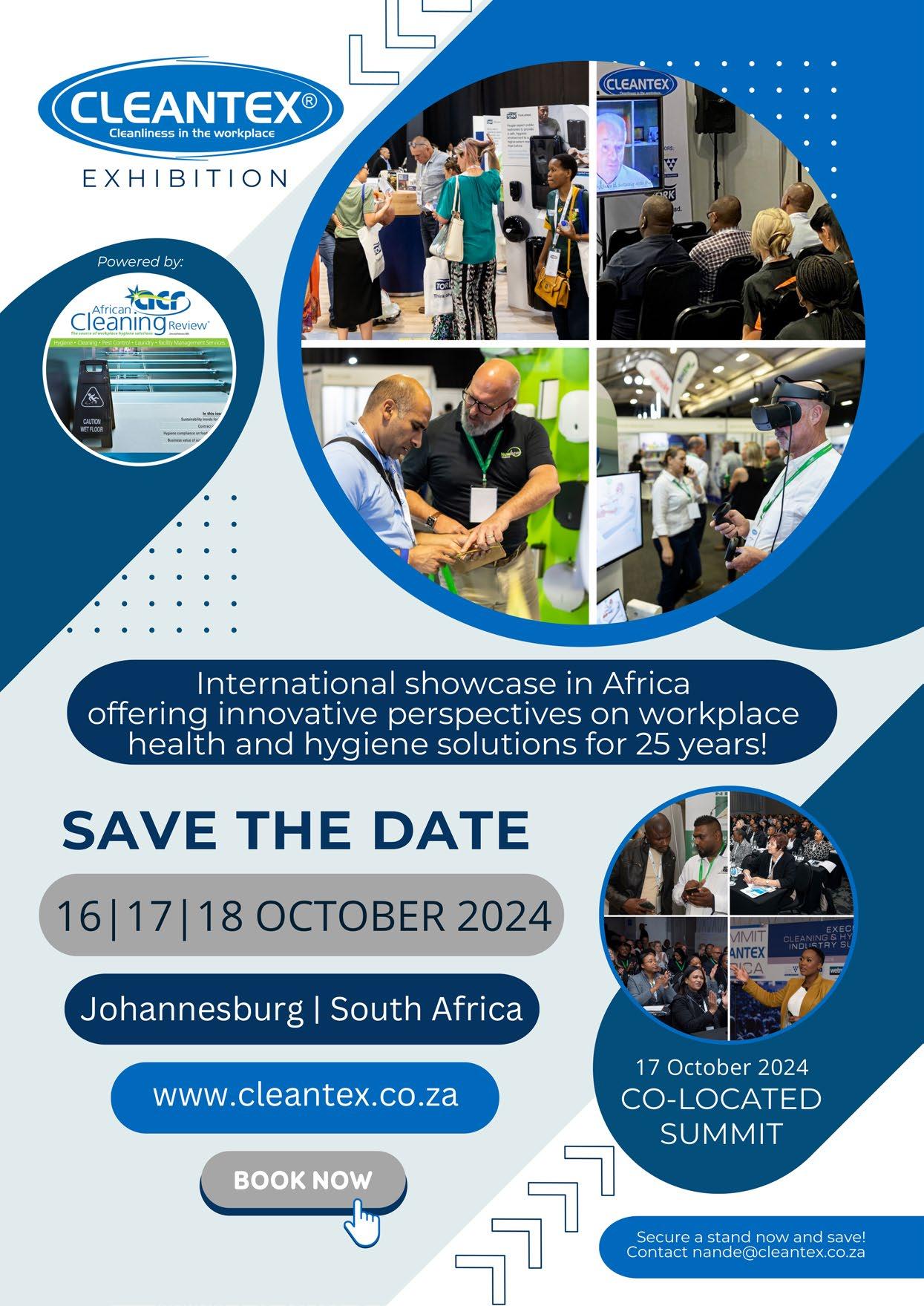®
September/October 2023
Hygiene • Cleaning • Pest Control • Laundry • Facility Management Services
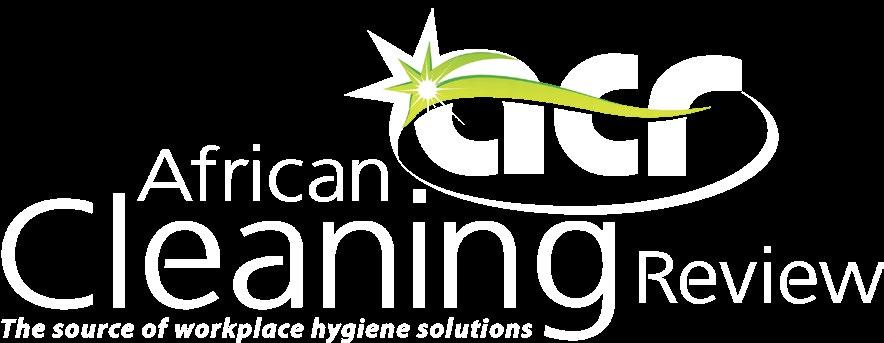
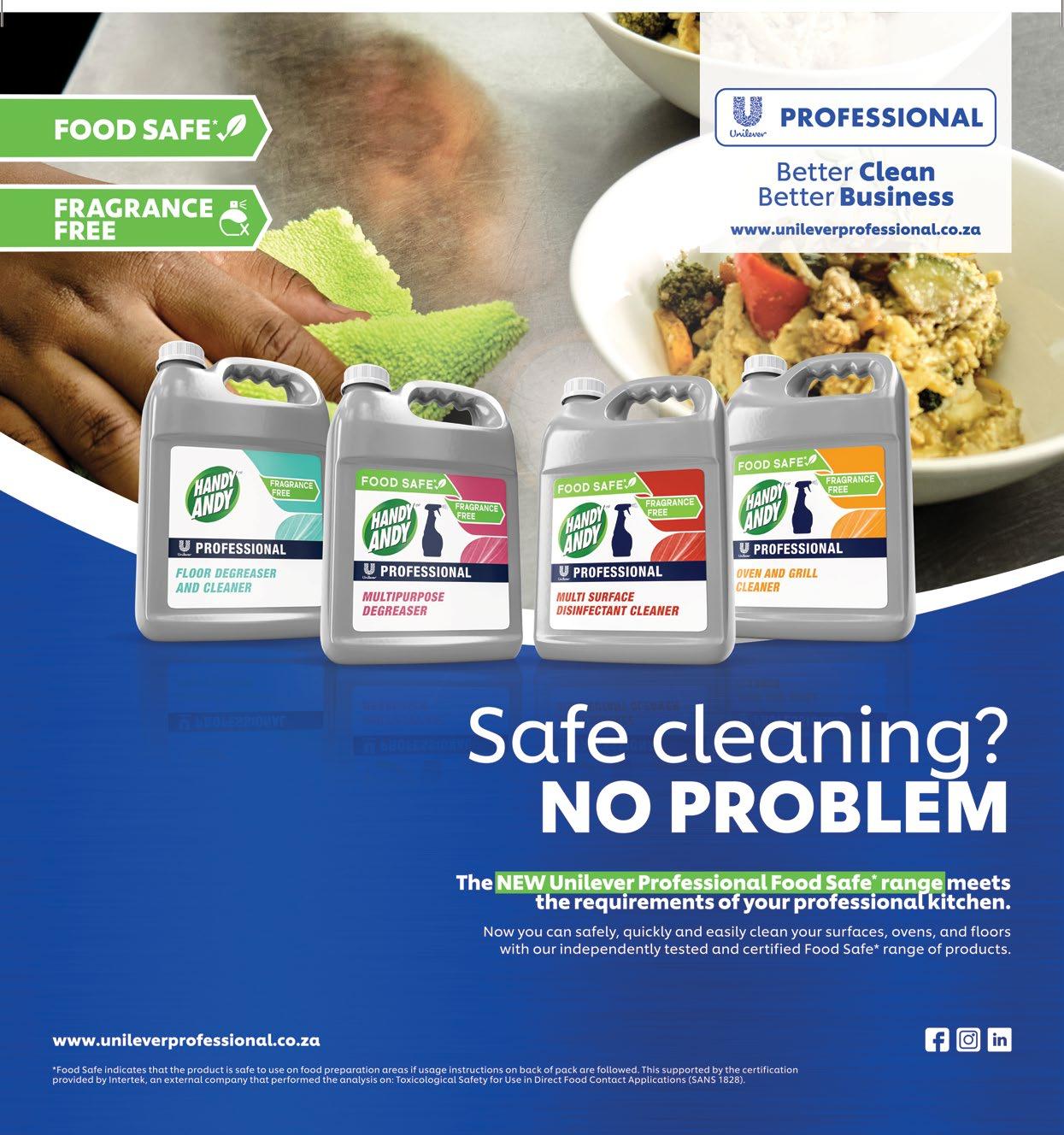
In this issue:
Cleaner, greener, smarter washrooms
Sustainability in cleaning
AI in air freshener solutions
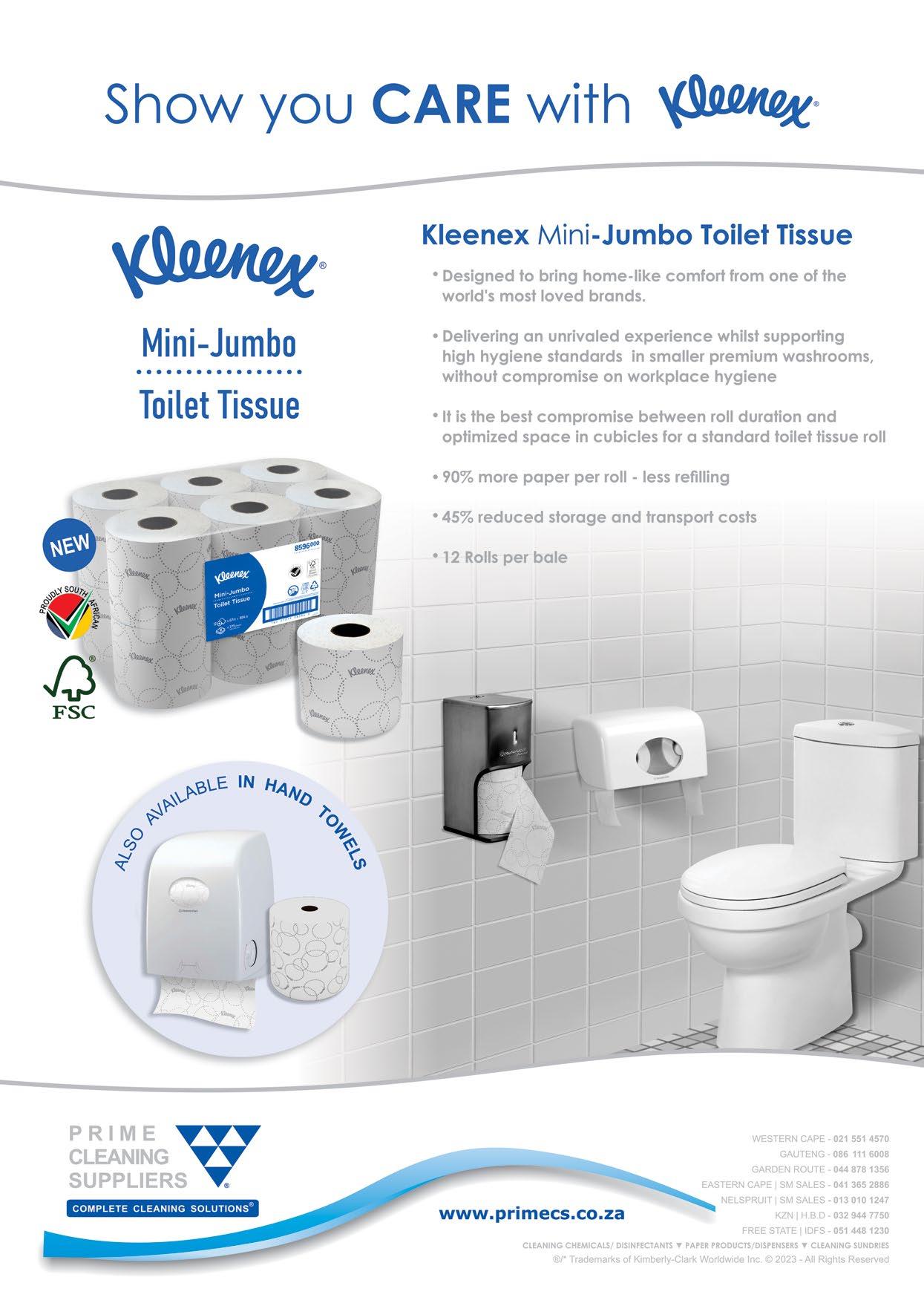
•
SEPTEMBER/OCTOBER 2023
VOL 24 NO. 5
Cover story
WE THINK CLEAN – Unique in their value proposition and distinct from retail products, Unilever Professional Products are engineered to meet specific business needs for the best results with minimal effort. With trusted brands used by millions of people worldwide, Unilever Professional means having peace of mind and results you can trust. We engineer products for a variety of businesses including: food service/ restaurants, hospitality, public washrooms and other establishments. Unilever Professional has been meeting the specific needs of households and businesses for years, providing the best results with minimal effort every time. Our brands are trusted by millions of people worldwide and for a good reason.
No matter your business’s needs, Unilever Professional makes cleaning easy with brands you can trust to give you exceptional results. It’s the professional choice. Read more on page 14.
African Cleaning Review is aimed at end-users, contractors and suppliers of products and services to Africa’s Cleaning, Hygiene, Maintenance, Laundry, Pest Control and Facility Management Services, industries. It is published every other month by: e-squared publications.
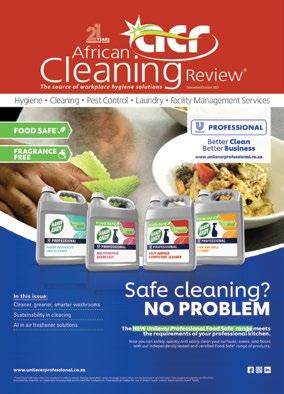
Tel: +27 (0) 11 238 7848 or +27 (0) 72 611 1959
PO Box 1976, Halfway House, 1685, South Africa
Email: africancleaningreview@cleantex.co.za
Website: www.africancleaningreview.co.za


@AfricanCleanMag AfricanCleaningReview

african-cleaning-review
Publishing Editor: Johann van Vuuren
+27 (0) 11 238 7848 or +27 (0) 72 611 1959
Email: africancleaningreview@cleantex.co.za
Advertising: +27 (0) 11 238 7848 or +27 (0) 72 611 1959
Email: africancleaningreview@cleantex.co.za
Operations and Accounts: Nandé Jacobs
Email: africancleaningreview@cleantex.co.za

• Innovative dispenser earns prestigious design award for elevating washroom experience
• Global Executive Summit set for Amsterdam in 2024
• Recycling efforts keep tonnes of paper and paper packaging out of landfills
• Sea Chefs and Diversey announce global collaboration
• Expanding Bidvest Noonan acquires two Northern Ireland companies
• Using art and song to help tackle South Africa’s plastic waste
• When you clean, go
• Create a sustainable washroom by starting with a reduction in waste

• Eliminating use of single-use plastics in washrooms
• Advanced washroom technology delivers hygiene and more
•
•
•
• Cut energy costs through heat recovery
• New format for textile care expo in France

• Green Cleaning Movement leader addressed Africa Summit
• Client open day in Cape Town
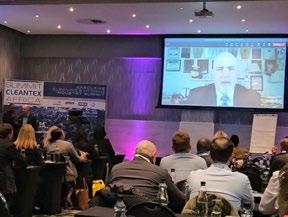
• Professional body’s 4th AGM
• ISSA director visits major equipment importer


• Women’s Day celebrated with artistic unmasking event
New Products 32
• Spunlace wipers for critical clean environments
• Upright scrubber-dryer another first from Hako
Planned features for 2023
Feature sections in every issue:
• Laundry and dry cleaning review
• Facilities management review
November/December issue: Editorial deadline 13 October
• Hospitality cleaning solutions
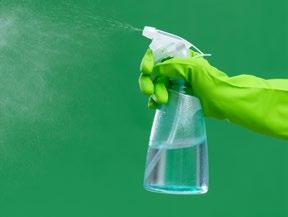
• Retail cleaning solutions
January/February 2024 issue: Editorial deadline 15 December
• Contract cleaning
• Food and beverage hygiene solutions
2024 Buyer’s Guide: Final deadline 15 December

• Secure advertising
• Submit entries
• Update company details
UPDATE
Complete
Published
All editorial contributions can be sent to the editor who reserves the right to publish editorial based on the strength of its content. No articles or photographs may be reproduced, in whole or in part, without written permission from the publishers. Although every effort is made to ensure the accuracy and reliability of material published in African Cleaning Review, e-squared publications and its agents can accept no responsibility for the veracity of the claims made by contributors, manufacturers or advertisers. Copyright of all material published in African Cleaning Review remains with e-squared publications and its agents. Official

1 African Cleaning Review September/October 2023 20 Opinion 2
Industry News 4
Sustainability in South Africa: Managing risks and making informed business decisions
Editorial 9
Report Features Sustainability
cleaning 10
crisis
• Numatic Sustainability
in
green
16
Cleaner, greener, smarter washrooms
• The all-important public washroom experience
rooms Advertorial 14
Cleaning for health and safety in gym locker
big
Review 24
• Preparing for the festive season: Buying smart and saving
FM
Putting the ‘AI’ in air freshener solutions
Laundry Review 26
Driving continuous improvement of sustainability skills and knowledge among building professionals
29
People and Events
contents
publication and media partner of:
by: 10 3 24
YOUR
COMPANY DETAILS
the 2024 Buyer’s Guide entry form on page 33 and email to africancleaningreview@cleantex.co.za
Sustainability in South Africa: Managing risks and making informed business decisions from the editor
Accentuating the focus on sustainability
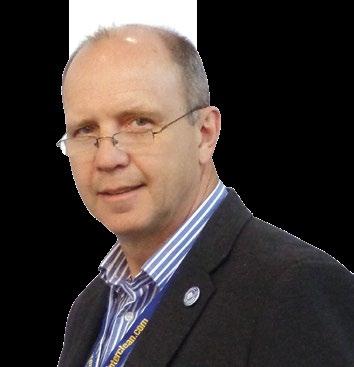
I wish to start off with feedback of this year’s industry event, the Cleantex Executive Summit, held in Cape Town during September. The summit was a resounding success, sold out in advance, packed with cleaning professionals occupying executive positions, which bolsters the objective of staging an annual industry educational and networking experience, including a niche expo that provides delegates with the necessary knowledge to build their company’s vision for success. Carefully selected executive sessions, presented by subject matter specialists, addressed pertinent issues including strategic management, customer experience strategy and journey mapping, sales strategies, workplace teamwork productivity, sustainability in cleaning, and the 100-year success story of the Worldwide Cleaning Industry Association, the ISSA.
The keynote presentation via video link from California by Stephen Ashkin was undoubtedly the highlight of the day. He is widely considered the Father of Green Cleaning. In his address to cleaning professionals from Botswana, South Africa and Zimbabwe – a first for Africa, Ashkin shared his vast knowledge and experience of sustainability in cleaning and his efforts to move the global cleaning industry from green to sustainable. View the pictures and video of the summit at: www.cleantexsummit.co.za
As facility managers become more conscious about the brands they purchase from to present facilities that prioritise sustainability and reduce waste, this issue features sustainability in cleaning as one of our regular highlights. Furthermore, this issue also takes a closer look at the move towards cleaner, greener and smarter washrooms, making the user experience more pleasant.
Enjoy the read!
Stephen Ashkin was the keynote speaker at the recent Cleantex Executive Summit held in Cape Town on 7 September. Entrepreneur and thought leader Steve Ashkin is widely considered the Father of Green Cleaning. In addition to having a long list of accomplishments and awards, ISSA, the Worldwide Cleaning Industry Association, recently recognised Ashkin as one of the most influential members of the cleaning industry over the past 100 years. In his address to cleaning professionals from Botswana, South Africa and Zimbabwe – a first for Africa, Ashkin who serves as president of the Ashkin Group, shared his vast knowledge and experience of sustainability in cleaning and his efforts to move the global cleaning industry from green to sustainable.
The term ‘sustainability’ is much more than just a buzzword. While earlier definitions often confined sustainability to environmental issues, it has now broadened to include social and organisational governance matters. This expansion recognises the intertwining of ecological, societal and governance issues and ultimately emphasises the importance of making informed business decisions.
At its core, sustainability is about managing risks, ensuring business continuity, and making informed choices based on a wider spectrum of considerations ultimately leading to greater profitability. Fundamentally, sustainability should simply be thought of as ‘smart’ business.
Sustainability and risk management
Every organisation, regardless of size, faces a variety of risks. These risks can be financial, operational or reputational, and they often become intertwined with environmental, social and governance (ESG) issues.
By integrating sustainability into core strategies, businesses can proactively identify, assess and manage these potential threats.
• Environmental risks: Climate change, resource scarcity and environmental degradation pose significant threats to many sectors. For instance, a company heavily dependent on water might face supply challenges in a drought-prone region. By investing in water-saving technologies and practices, the company not only conserves a precious resource but also safeguards its operations from interruptions.
• Social risks: Social challenges such as labour issues, community relations and human rights can have direct and indirect impacts on a business. Companies that neglect their workers’ rights might face legal sanctions, strikes or boycotts, all of which can disrupt operations and tarnish reputations.
2
opinion
• Governance risks: Proper organisational governance is key to ensuring that a company operates with integrity and transparency. A lack of sound governance can result in financial discrepancies, unethical practices and decreased stakeholder and customer trust. Adhering to sustainability guidelines can help companies create a robust governance framework, thereby minimising associated risks.
Sustainability as a continuous improvement process
Much like the Green Cleaning Movement, sustainability is not a static endpoint but a journey of continual improvement. Markets change, technologies evolve and societal expectations shift. What may be considered sustainable today may not be sufficient tomorrow. This dynamic requires companies to be flexible and adaptive in their approach to sustainability. This dynamic also requires that companies act, and act now!
Specifically for the cleaning industry, ISSA – the Worldwide Cleaning Industry Association with its 10,500+ corporate members supporting 100 million cleaning personnel around the globe, has launched a member-led sustainability initiative. The initiative’s goal is to assist ISSA members when responding to sustainability requests from customers, as well as to help members implement sustainability, efficiency, social equity and other related business strategies in their own organisations. Here is the link to the application, which is free and will take less than 10 minutes to complete.
Sustainability: Beyond financial metrics
Traditionally, businesses have been primarily evaluated based on their financial performance. Now businesses are beginning to look beyond the balance sheet. They are keenly interested in understanding their and their supplier’s environmental stewardship, social responsibilities and the robustness of their governance structure. This shift underscores the importance of nonfinancial information in today’s business evaluations.
Sustainability acts as a comprehensive business framework addressing this non-financial information. It provides insights into a company’s broader impact and value, considering its ecological footprint, societal contributions and governance practices. Such a holistic view is instrumental in building trust and credibility among stakeholders.
Sustainability in South Africa
Furthermore, these issues and attitudes are not just relevant for companies based in the European Union, United States or elsewhere. South Africa has over the past few years been actively engaged with developing sustainability reporting requirements, especially due to the increasing demand for transparent and accurate reporting from the likes of the Johannesburg Stock Exchange’s (JSE) ESG reporting requirements, which have set standards for companies to disclose their ESG risks and opportunities.
The JSE is developing Sustainability Disclosure Guidance, including Climate Change Disclosure Guidance specifically

tailored to the South African context. These guidelines aim to assist JSE-listed companies, institutional investors and other stakeholders in understanding the climate crisis, identifying risks and opportunities and linking sustainability disclosures to value creation.
While members of the cleaning industry may not directly report to the JSE, it is expected that reporting requirements will be driven by large customers. This is expected as South African companies are being urged to take action on sustainability because it will be mandated by local and international regulators such as the JSE, the International Sustainability Standards Board (ISSB), as well as the US Securities and Exchange Commission (SEC), among others.
In conclusion, sustainability is no longer a peripheral or optional consideration for cleaning businesses. It is central to managing risks, ensuring long-term viability and staying competitive in the market. Beyond its risk mitigation benefits, sustainability offers businesses a framework to measure their operations holistically, considering not just financial metrics but also the broader impact they have on the world. As the understanding and appreciation of sustainability continue to grow, the business strategies and decisions of tomorrow will inevitably be shaped. Cleaning companies that embrace and integrate sustainability into their core operations will undoubtedly be better positioned for enduring success in an ever-changing global landscape.
3 African Cleaning Review September/October 2023
opinion
Stephen Ashkin
Kimberly-Clark Professional was declared as the winner of this year’s world-renowned iF DESIGN AWARD in the bath category for the company’s ICON™ dispenser collection. Hannover-based iF International Design Forum GmbH is the world’s oldest independent design organisation. The judging panel comprised 133 independent design experts from across the globe, and the
Innovative dispenser earns prestigious global design award for elevating washroom experience
competition consisted of nearly 11,000 entries submitted from 56 countries.
“We are proud to be recognised with the iF DESIGN AWARD for our Kimberly-Clark Professional ICON dispensers, which represent our most significant upgrade in technological advancements in over a decade,” said Mayur Valanju, vice president of product development and innovation at Kimberly-Clark Professional. “With an increased emphasis on hygiene, handwashing and washroom experience, we wanted to create a product that elevated the washroom both aesthetically and operationally.”
The Kimberly-Clark Professional ICON dispenser collection won the judges over with its unique

Global Executive Summit set for Amsterdam in 2024
The premier event for the world’s leading facility services contractors, Global Executive Summit 2024, will be hosted by the World Federation of Building Service Contractors in conjunction with Interclean Amsterdam. The powerful one-day event provides insights, training and networking in addition to access to the leading vendors showcasing the latest technology at Interclean Amsterdam 2024.
This event is tailored to building service and facility maintenance contractors, with executive education, insights and networking to help them notice the trends
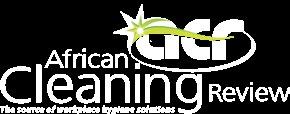
that will impact the industry, understand the challenges that their customers face and prepare their organisations for changes needed to thrive.
Global Executive Summit 2024 will be held in conjunction with Interclean Amsterdam, taking place from 14 to 17 May 2024. Interclean Amsterdam is the largest professional

combination of aesthetic flexibility and functional excellence, elevating the entire user experience. The Kimberly-Clark Professional ICON collection is a family of hand towel, soap and toilet paper dispensers, which include a first-of-its-kind dispenser that offers interchangeable and customisable faceplate options to elevate commercial washrooms with added sophistication and enhanced functionality. While most dispensers are designed around the paper, the Kimberly-Clark Professional ICON dispenser is designed around the service provider, facility manager and end user – offering style, simplicity, cutting-edge technology and a humancentric experience.
cleaning community in the world and is unsurpassed in its role as an international business networking platform for the cleaning and hygiene industry. Global Executive Summit attendees will have access to the Interclean Amsterdam trade show.
For more information, visit: www.wfbsc.org
4 African Cleaning Review September/October 2023
industry news
Contact us for more information regarding cost-effective advertising options: africancleaningreview@cleantex.co.za | www.africancleaningreview.co.za Promote your company in the Source of Workplace Hygiene Solutions! Reach your target market cost effectively by advertising in African Cleaning Review. The direct link to end-users, building service contractors, FM service providers and key institutional sectors.
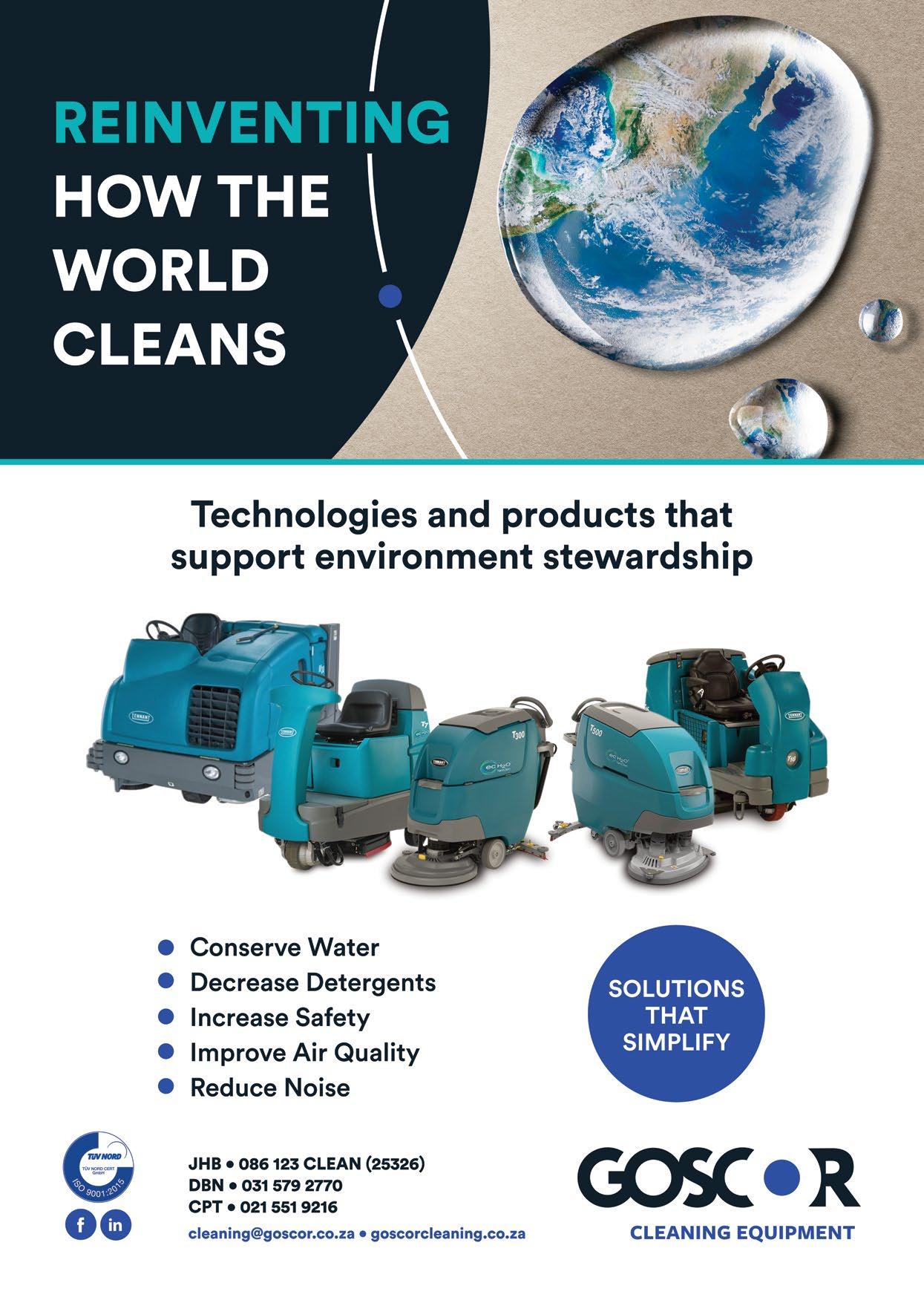
Recycling efforts kept tonnes of paper and paper packaging out of landfills
Due to the waste separation efforts of conscientious citizens, businesses, schools and the greater recycling industry, South Africa recycled just less than 1.3 million tonnes of paper and paper packaging in 2022. If baled and laid out, this would cover 161 rugby fields.
The same amount would weigh as much as 208,553 mature African elephants or fill 1,502 Olympic-sized swimming pools. “More importantly, it saved 3.8 million cubic metres of landfill space, and ensured that the paper industry could reuse the fibre in cardboard boxes, grocery bags, egg boxes, newspapers and tissue products,” explains Samantha Choles, communications manager of the Paper Manufacturers Association of South Africa (PAMSA).
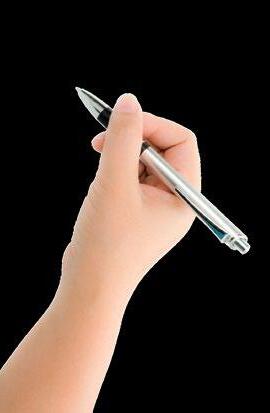

“We are certainly seeing more paper packaging entering the market as several brands are shifting to paper, especially in primary packaging – the packaging that contains the item,”
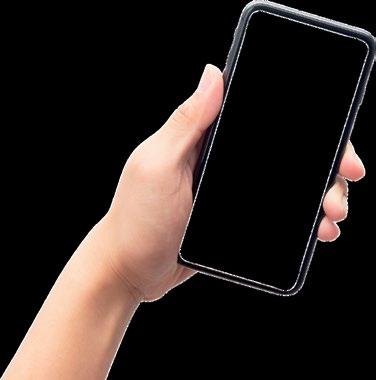

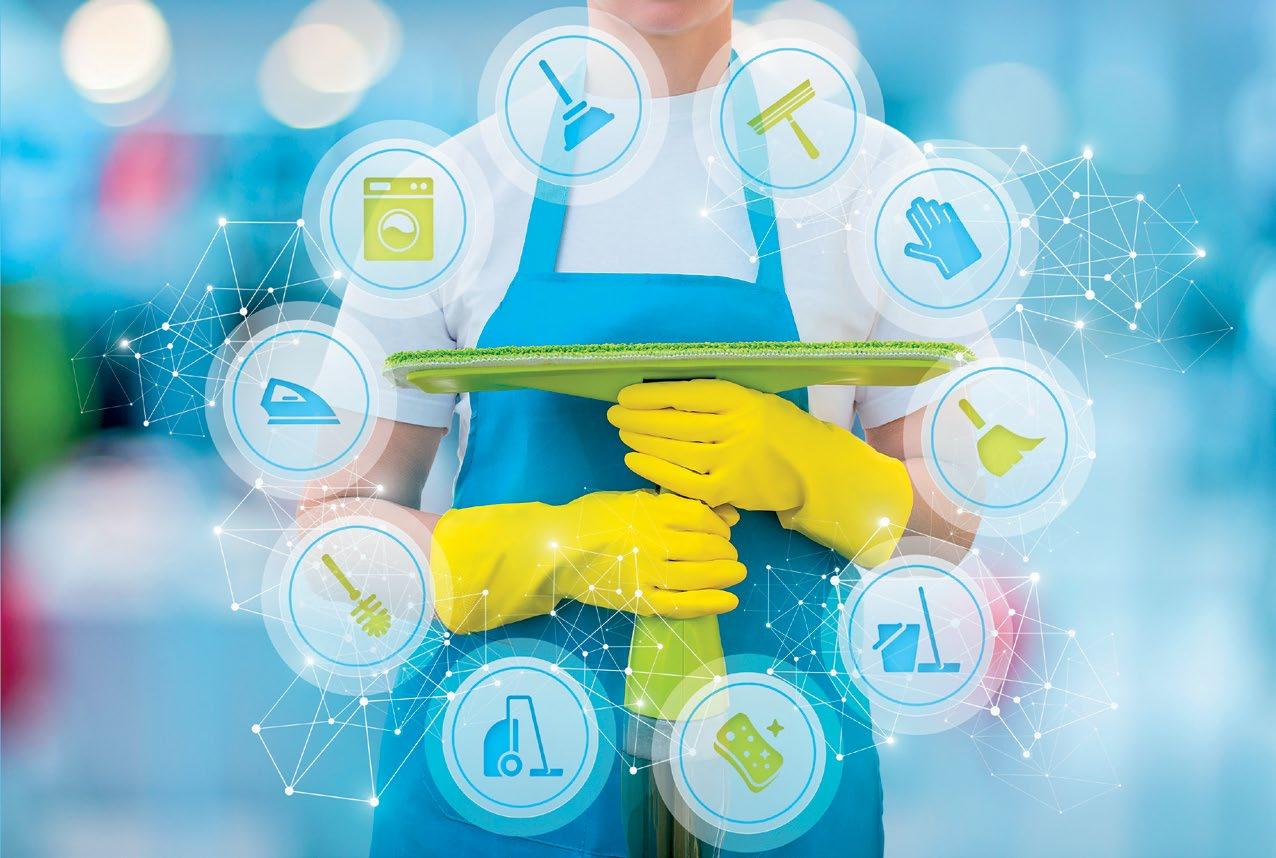
big brands reducing plastic in their packaging or at least aiming for singlematerial packaging that is locally recyclable.
During 2022, South Africa produced 1.96 million tonnes of pulp, paper, board and tissue, importing just over one million tonnes and exporting 540,000 tonnes. This put the apparent consumption of paper and paper packaging at 2.45 million tonnes.
therefore excluded from what is available for collection. In 2022, two million tonnes were deemed collectable. This excludes 410,000 tonnes of secondary corrugated packaging comprising export fruit, wine and other products. Similarly, PAMSA includes the corrugated packaging, containing imported goods, which therefore becomes available for the recycling market.
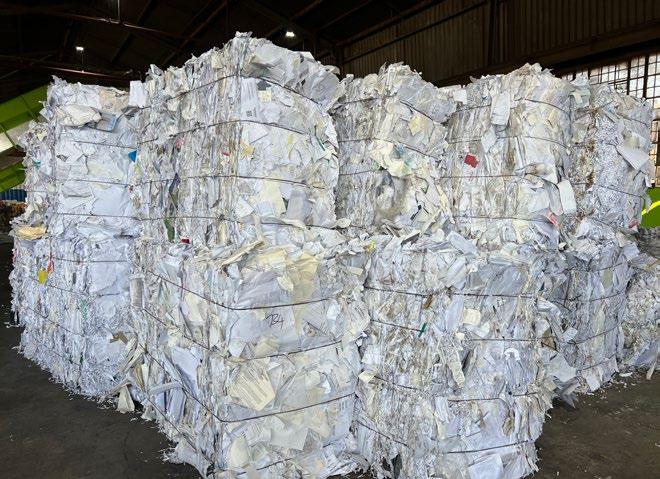
industry news
HYGIENE | CLEANING | PEST CONTROL | LAUNDRY | TE MANAGEMENT | FACILITY MANAGEMENT SERVICES The definitive online reference guide for workplace hygiene solutions then looknofurther... africancleaningreview.co.za Looking for cleaning or hygiene products /services?
Sea Chefs and Diversey announce global collaboration
One of the world’s leading partners of shipping companies and tour operators in the cruise industry, Sea Chefs, and Diversey, a leading hygiene, infection prevention and cleaning solutions provider, recently announced their global partnership for the supply of housekeeping, kitchen care, laundry and infection prevention solutions. This announcement follows a rigorous and in-depth analysis of Diversey’s innovations, programmes, resources and capabilities as well as a series of successful trials and first-class vessels implementation.
The collaboration will provide Sea Chefs with a robust and resilient supply chain and expert customer service, along with significant complexity reduction and enhanced environmental footprint through the increased use of super-concentrates delivered by state-of-the-art equipment. Diversey’s solutions will help Sea Chefs continue to focus on providing outstanding service in the areas of hotel, catering and crew management on board cruise ships. Renowned Sea Chefs customers include the TUI Cruises fleet with the premium all-inclusive concept, the luxury and expedition fleet from Hapag-Lloyd Cruises, the wellknown ships from Phoenix Reisen and several first-class river cruise ships.
This large global agreement confirms Diversey’s hefty return to the cruise industry and its ambition to bring first-class service, flawless implementation and a leading-edge portfolio of efficient and sustainable solutions to the industry.

www.cleaningworld.co.za

The Eureka Bull200 is a robust heavy duty sweeping


machine, built to last in high demanding and intensely industrial environments. Combining the automotive steering system, with the direct for ward throw sweeping, this machine can be maneuvered in confined and congested areas, par ticularly in modern logistic warehouses where goods are constantly being moved around. What makes this machine different to other models, is its ability to pass over speed bumps and manage sudden changes in gradient levels. With the capability to overcome gradients of 21%, the Bull200 is extremely well suited for larger parking bays, and multi stor y areas. The cleaning path of 2310mm, results in maximum pick up, combined with the compacting dump system which utilizes all available space, preventing users from having to actively stop operation to empty the 500L tank With the entire body and chassis made of steel, The Bull is resistant to impacts and protects the inside components in tough conditions. The additional extendable front brush, grants easy accessibility to clean along walls and dips in the floor, and is controlled with a joystick placed on the drivers console. Security and driving
wipers. The unique
ro te c t i o n to t h e o p e r a to r a n d provides full visibility of the right-side brush during sweeping. The Bull200 is the ideal solution for larger cleaning operations.
For more information or a demonstration, reach us on 021 788 3038 or email info@cleaningworld.co.za
7 African Cleaning Review September/October 2023
c o m f o r t a re i n c re a s e d t h a n k s to a h i g h v i s i b i l i t y c a b i n , complete with
conditioning, heating and
d e s i g n of f e r s m a x i m u m p
air
industry news
Expanding Bidvest Noonan acquires two Northern Ireland companies
Professional cleaning and security services group Bidvest Noonan, based in Belfast, announced the acquisition of Robinson Services and its specialist security business Sword Security, thereby scaling up its presence in Northern Ireland.
The two new additions employ more than 900 people in the region, and this is the second major investment in Northern Ireland that Bidvest Noonan has made in recent years, making it a cleaning and security services market leader across the UK and Ireland. The addition of the two companies
further strengthens Bidvest Noonan’s capability in the region, combining their extensive expertise, experience and resources to deliver exceptional results to clients.
Jim O’Hagan, managing director of Bidvest Noonan’s business in Northern Ireland said: “Our two businesses are highly compatible, which will allow us to achieve a seamless transition. For our customers and our people this means our operations will continue as normal, with the same dedicated teams delivering the highest standards of service”.
Robinson Services managing director David Robinson added: “It’s a very exciting time for all of us at Robinson Services and Sword Security as we become part of Bidvest Noonan. Our businesses have so much in common, including our commitment to putting people first, creating exceptional service solutions through imagination and expertise, and our dedication to building strong and long-lasting relationships with our customers”.
For more information, visit: www.bidvestnoonan.com
Using art and song to help tackle South Africa’s plastic waste crisis
Seven tonnes of plastic waste has been successfully diverted from the environment thanks to a pioneering new collaboration in South Africa, which aimed to change behaviour through art, song and comedy skits, as well as practical measures.
Researchers from the University of Portsmouth’s Revolution Plastics team and the Department of Agriculture, Rural Development and Environmental Affairs (DARDLEA) partnered with UK-based charity WasteAid to run a pilot study in the Thembisile Hani Local Municipality in Mpumalanga. They combined creative ways to educate people about the dangers of dumping and burning waste with on-the-ground action to increase waste recycling including supporting informal waste collectors and introducing community drop-off points for recyclables.
The pilot study has made promising strides in combatting the problem of plastic waste, with two-thirds of local people reporting a positive change in their environment as a direct result of the project. A survey of local residents showed that arts-based methods – in particular the creation of murals – were significant drivers in the success of the project.
Murals sensitised 86 percent of those who saw them on how to separate waste and changed the attitudes and behaviour of 80 percent of those who saw them. By the end of the project, the amount of waste managed by burning or dumping had fallen by 27.7 percent.

In just three months, the Masibambisane project successfully diverted seven tonnes of plastic waste, the equivalent weight of a large African elephant, from entering the environment. The uncontrolled disposal of plastic waste in the area poses a severe threat to the environment and human health, with waste often burned, contributing to climate change and poor air quality.
Working closely with the local community, WasteAid implemented strategies to enhance plastic-waste collection and boost the revenue for local collector groups. The project focused
on both supply-side factors, such as educating households on better waste separation and providing collection bins, and demand-side factors, including training collectors on the types of plastics with value and promoting good business management. Additionally, the project facilitated connections with offtakers committed to purchasing plastic waste regularly from collectors.
Dr Cressida Bowyer, deputy director of Revolution Plastics at the University of Portsmouth, said: “Sensitisation is a vital process for educating communities, raising awareness and inspiring behaviour change. To make messaging more effective, it’s important for the message creators to reside in the target community, understand local social and cultural contexts, and actively participate in the production of campaign materials”.
8 African Cleaning Review September/October 2023 industry news
Numatic Sustainability Report
Leading cleaning equipment manufacturer, Numatic International released its 2023 Sustainability Report, outlining its ambitious plans to become net zero by 2035. The report highlights the company’s progress in reducing its environmental impact over the past year, including:
• A 625,000kWh reduction in electricity and gas consumption.
• A 25% increase in the use of electric and hybrid vehicles.
• A 95-ton increase in the use of recycled plastic.
• A 90,000-ton reduction in CO2e per year.
• 100% of its Janitorial range utilises recycled ReFlo plastic.
• Saved 37.5 tons of CO2 with plastic packaging reduction targets.
“We are committed to making a positive impact on the environment,” says Chris Duncan, chairman and founder of Numatic International. “Our net zero goal is ambitious, but we believe it is achievable with the right investment and commitment.” Numatic’s

commitment to sustainability is a welcome development in the cleaning industry. As businesses and consumers become more aware of the environmental impact of cleaning products and practices, there is a growing demand for sustainable cleaning solutions. Numatic is leading the way in this area and its efforts are sure to be an inspiration to other manufacturing companies.
Some of the ways that Numatic is making a difference:
• The company is installing solar panels on all of its UK sites. This will generate clean, renewable energy that will help Numatic reduce its reliance on fossil fuels.
• Numatic is upgrading its manufacturing processes to be more energy efficient. This will help the company reduce its carbon footprint and save money on energy costs.
• Numatic is developing new products that are more sustainable. The company’s new range of vacuum cleaners, for example, are made with recycled plastic and use less
energy than traditional vacuum cleaners.
• Numatic is working with its suppliers to reduce their environmental impact. The company is asking its suppliers to use more sustainable materials and practices in the production of its products.
Numatic’s commitment to sustainability is a positive step for the cleaning industry and for the environment. The company is leading the way in developing and implementing sustainable cleaning solutions and its efforts are sure to have a ripple effect throughout the professional cleaning industry.
For more information, visit: www.numatic.co.za
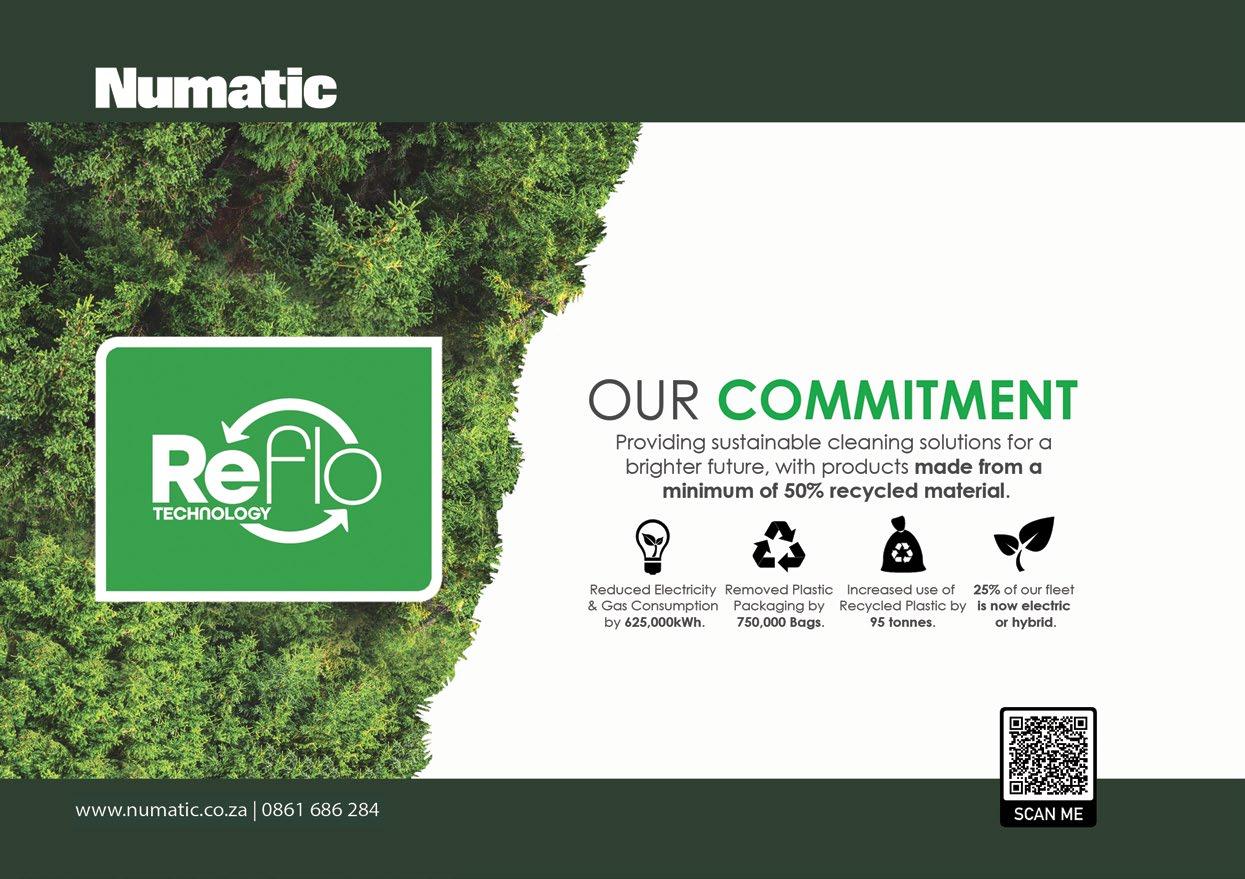
editorial Numatic
When you clean, go green
Finding new ways to implement sustainable hygiene practices can help benefit your facility as well as the planet.
The public is continuing to become more conscious about the brands they purchase from and prefer facilities that prioritise sustainability. It’s now more important than ever that facility managers address their current sustainable practices. Along with incorporating sustainable practices, occupants also prefer facilities that prioritise health and safety through hygienic practices, says Mark Kirchgasser, vice president of sales – Away from Home, at Sofidel.
Go touch-free
When people are out on the go, they want a safe and clean place to go. Providing washrooms that prioritise sustainability and hygiene practices can help improve customer satisfaction. A study found that there are up to 229,000 germs per 6.4516 cm2 on hightouch surfaces in washrooms such as handles of frequently used faucets, as well as 83 bacteria per 6.4516 cm2 on flush handles. Switching to touch-free appliances such as automatic toilets, faucets and soap and paper-towel dispensers is a great way to reduce touchpoints that can allow bacteria to transfer.
This also provides a sustainable alternative as many manufacturers supply soap and paper towels for touchless appliances in bulk. Research has found that 20 companies are the source of 55 percent of the world’s single-use plastic waste, while the world’s top 100 companies account for more than 90 percent. Switching to touch-free appliances eliminates the need for plastic soap pumps, which
reduces the amount of single-use plastic as well as the carbon footprint of frequent product shipment and delivery.
Re-evaluate cleaning chemicals
Most commonly used cleaning products contain hazardous chemicals that can damage the environment and end-

to improve air quality within facilities as they don’t emit pollutants into the air that are found in common cleaning products. Hiring professionals to clean your facility allows them to restock hygiene products on a routine basis and saves your employees time. This helps ensure hygiene measures are being met while also reducing the need to
users as well as building occupants. Sustainable cleaning products are made with ingredients that contain fewer harsh chemicals and safer ingredients, resulting in a truly cleaner facility. Green cleaning products have also been proven
frequently repurchase plastic cleaning supplies, which can be costly and take up inventory space. This results in a regularly maintained facility while benefiting your business and the environment.
10 African Cleaning Review September/October 2023
feature sustainability in cleaning
Sustainable cleaning products are made with ingredients that contain fewer harsh chemicals and safer ingredients, resulting in a truly cleaner facility. Green cleaning products have also been proven to improve air quality within facilities as they don’t emit pollutants into the air that are found in common cleaning products.
Be transparent
It’s important to be transparent with your customers when reporting your business’s sustainability and cleanliness tactics. With the presence of digital technology, companies can be exposed to bending the truth, or even flat out deceiving customers. This can result in a negative impression that can be difficult to recover from. Consumers value business transparency now more than ever. Eighty-five percent of consumers say a business’s history of being transparent makes them more likely to give it a second chance after a bad experience.
This doesn’t mean that businesses can’t benefit from acknowledging their mistakes. Transparency allows the opportunity to make changes that improve business and exceed customers’ preferences. Share how your business plans to make
sustainable changes whether it’s product ingredients, manufacturing processes or packaging and shipment procedures. Transparency allows for business growth that shows customers they are valued.
Set your standards
Consumers aren’t the only ones who prefer a sustainably focused facility. Nearly 80 percent of employees find sustainable practices in the workplace to be an important focus. When it comes to cleanliness, a clean workplace has been linked to higher office morale and increased productivity. If your facility has a designated cleaning staff, providing routine training sessions will ensure they are up to date on cleaning standards, using equipment and green cleaning products and are exceeding your facility’s cleaning standards.
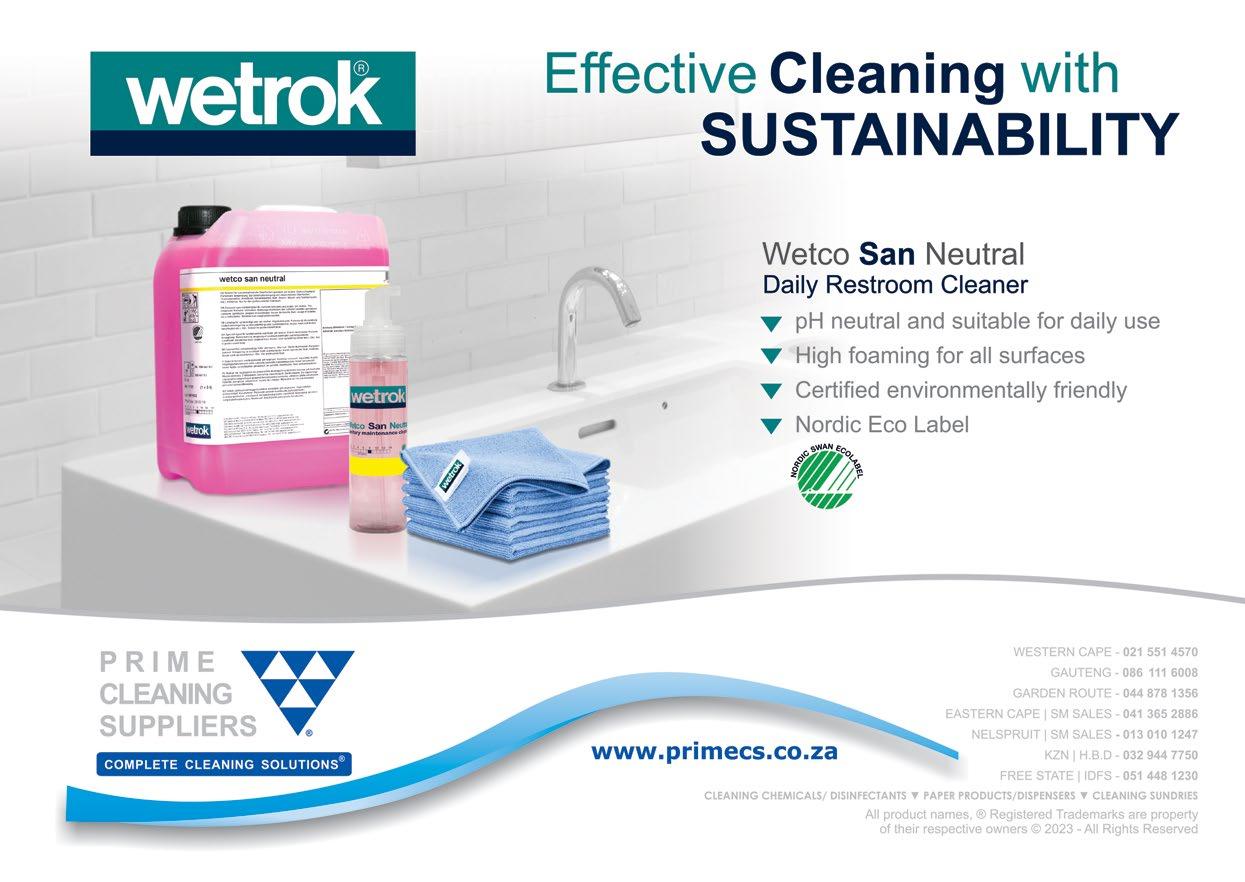
Facility managers can also implement small sustainable efforts in the workplace such as recycling bins, reusable utensils in the office kitchen, utilising digital documents over paper documents and encouraging employees to unplug electronics when they’re not in use. Offering sustainable alternatives promotes a healthy work environment that reflects positively on employees and the company’s image.
Protect your facility and the planet
Prioritising the health of occupants who enter your facility while also finding ways to better the planet benefits businesses by showing social responsibility. Implementing changes, big or small, can create a positive impact that shows customers that businesses are paying attention to them and are striving to make a difference in their communities.
feature sustainability in cleaning
Prioritising the health of occupants who enter your facility while also finding ways to better the planet benefits businesses by showing social responsibility.
Create a sustainable washroom by starting with a reduction in waste

In this article, Tom Marshall from Tork manufacturer Essity looks at various ways in which toilets around the world are becoming more sustainable and considers how a few simple changes can help to reduce waste in any public washroom.
Solar-powered toilets that use a closed-loop water system are currently being pioneered in South Africa. Created by Johannesburgbased Enviro Options, the system uses ozone along with a fine membrane to separate out waste and purify the water. This can then be reused indefinitely for flushing, which the company claims can result in water savings of 180,000 litres per month at each site.
Meanwhile, Phoenix Product Development claims its Propelair system has helped organisations across South Africa to reduce their annual water consumption by more than 80 percent. The system uses air to create a powerful flush using only 1.5 litres of water. Propelair units are now in operation in five South African provinces including Gauteng and the Western Cape.
Saving water is a key sustainability goal for washrooms across Africa. Other ways in which this can be achieved include the installation of automatic taps and by using dual-flush toilet systems that allow visitors to choose between a half or a full-flush option. And waterless urinals, too, have obvious water-saving advantages as well as requiring little maintenance and eliminating the issue of clogged drains.
But there is another commodity that is frequently wasted in the toilet: namely, paper. Reams of toilet tissue and huge numbers of hand towels are used in public washrooms every day, and efforts need to be made to limit their use where possible.
Many public washroom facilities are supplied with conventional toilet rolls because these are perceived to be a low-cost option. These rolls tend to be
threaded on a simple wire holder or left piled up on the cistern.
As a result, they frequently end up on the washroom floor where they become wet, soiled and unusable. Some might end up down the toilets where they will cause expensive blockages, while others could be pilfered.
Jumbo toilet rolls have the advantage of being housed in lockable units that prevent people from taking them away or contaminating them before use. However, the dispensers need to be periodically checked to ensure that the supply has not been allowed to run out. And cleaners may be tempted to replace a roll before it has been completely used up to avoid having to make a repeat visit, a practice that can lead to a great deal of waste.
Tork SmartOne© toilet paper dispensers are a good option in public
12 African Cleaning Review September/October 2023
feature sustainability in cleaning
washrooms because they automatically limit the amount of paper that visitors can take out at any one time, while the unit protects the paper from contamination before use. As a result, the system can reduce consumption by up to 40 percent1 compared with jumbo roll dispensers.
Paper towels left lying loose in the washroom units will also lead to excess paper waste because people will drip their hands on to them, making them wet and soggy.
And a poorly designed hand-towel dispenser will bring its own problems. For example, C-fold dispensers make it difficult for the user to pull out a single towel at a time, which means visitors will take out clumps of towels, potentially discarding the unwanted ones.
Tork PeakServe® ContinuousTM Hand Towel dispensers are a better option since they give out sheets of paper one at a time and protect the towels from contamination before use. This helps to reduce waste while also discouraging washroom visitors from taking out
feature sustainability in cleaning
more than they need. Systems that reduce water use and excess paper consumption are not the only ways in which toilets can be made to be more sustainable.
For example, an eco-friendly toilet at a South Korea university is currently offsetting energy bills and helping to grow plants on campus. The system uses microorganisms to break down the waste and turn it into methane and manure. The fertiliser is then used in the university gardens while the methane helps to power the facility’s ovens and boilers.
And now in operation in a construction site in the Swiss Alps is what is believed to be the world’s first portable toilet made entirely from plastic waste. The lavatory has been 3D printed by Spanish studio Nagami.
People are becoming increasingly conscious of the need to adopt sustainable practices at home, at work and in the washroom. This emerged in a survey of 2,000 office workers carried out by Essity to mark the UK launch of Tork PaperCircle®, the world’s
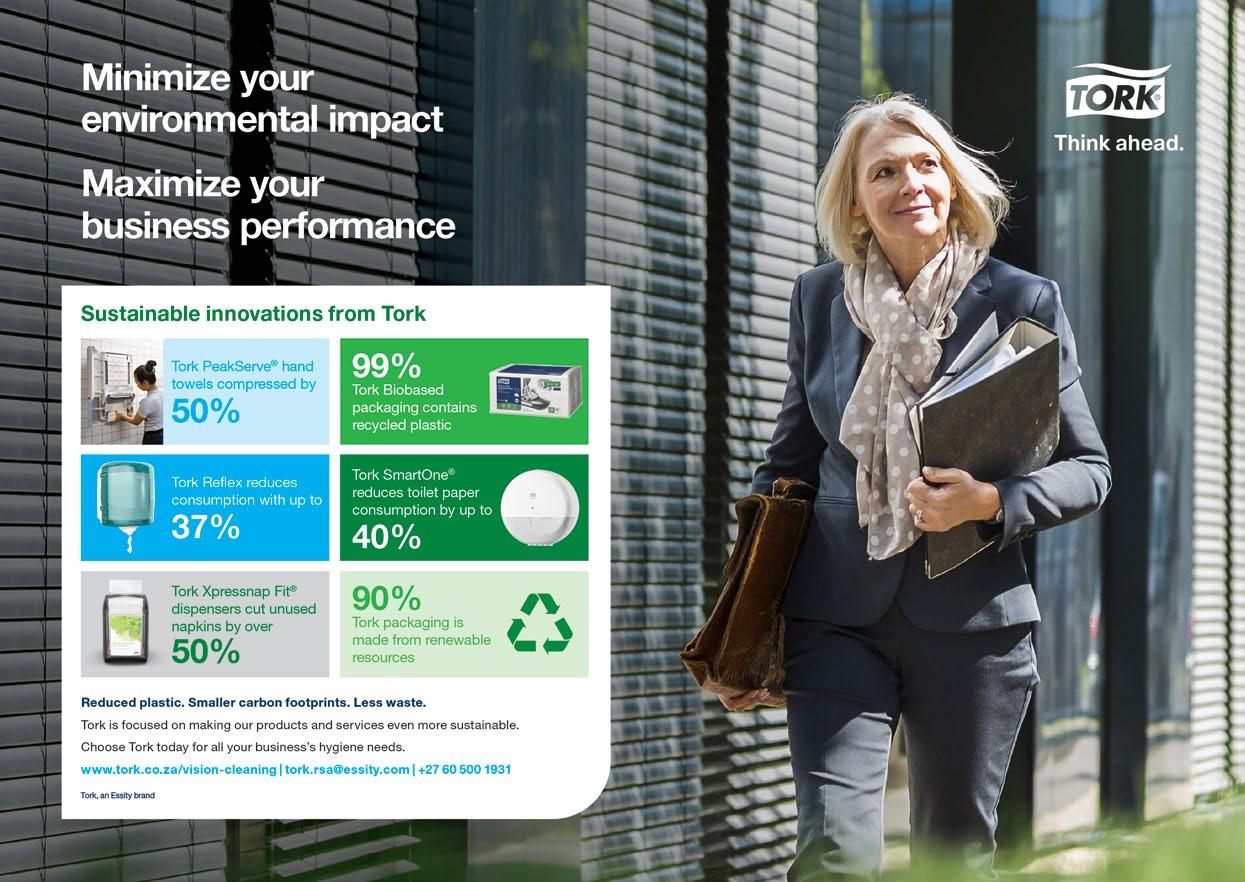
first recycling service for paper towels, which is currently in operation in various European markets.
Eight out of ten office employees said they would like their workplace to be more environmentally friendly, while 46 percent believed the green initiatives taken by their bosses were often an afterthought. And 48 percent felt concerns about costs were preventing their employers from encouraging more sustainable practices.
Sustainability is becoming an important issue for many of us, and most people need little encouragement to adopt more eco-friendly practices. It is time for public facilities to step up and provide washrooms that minimise the use of water and paper.
Reference:
1 Statistics from internal research on 7,729 users in Europe. Traditional maxi jumbo dispenser vs. Tork SmartOne® Twin Mini dispenser. Reduction accounted in square metre used per visit.
For more information, visit: www.tork.co.za
advertorial Unilever Professional
Preparing for the Festive Season: Buying Smart and Saving Big
Turn the Season into Success with Unilever Professional
A clean and welcoming establishment is paramount during the bustling festive period. As businesses gear up for the influx of guests, there’s always one burning question: How do we ensure we’re adequately stocked up and ready to provide an exceptional experience without burning a hole in our pockets?
The solution? Think big. Think bulk. Think smart. With some proactive steps, businesses can be festively frugal and save both money and time while delivering (and exceeding) their guests’ expectations.
Here’s the good news: Unilever Professional has your back!
1. Buy in Bulk and Reap the Benefits
With the festive season comes an influx of guests and the inevitable increase in cleaning needs. This is not the time to run out of your favourite cleaning solutions, especially when a spilt drink or gravy stain appears out of nowhere.
If you’re a business that penny-pinches the traditional way by purchasing one bottle at a time, you should consider this: When you buy in bulk, not only do you benefit from economies of scale (that’s a significant cost saving right there!), but you also reduce the risk of running short on supplies at crucial times.
Unilever Professional’s range of commercial bulk cleaning products gives you the best results with minimal effort – ensuring you save more while being ready for anything the festive season throws (or spills) your way.
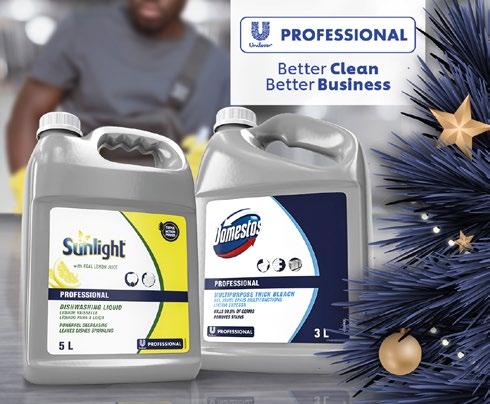
Event better, one of our trusted partners will deliver them right to your doorstep, making your cleaning routine smoother and more efficient!
3. Know Your Source and Your Needs
Choosing the right products in an overcrowded market can be overwhelming. But knowing where to get your products is half the battle won. With a brand as reliable as Unilever Professional, quality is a guarantee. Our products and tried, tested, and loved by millions worldwide.
But how much do you need? A quick tip: Look at your consumption patterns from the previous festive seasons. This gives a ballpark figure to start with. Remember, it’s better to be over-prepared than under.
4. Gearing Up for the Guest Influx
Increased family gatherings, guest influx, and general excitement means more footfalls in hotels, restaurants, and other places of business. Planning for this can be as simple as following a simple checklist:
• Stock up on core products
• Ensure your staff is trained to handle the festive rush
• Implement a more frequent cleaning schedule
• Ensure all hygiene protocols are up-to-date
The festive season is about celebrating and creating memories. And your business’s clean and hygienic spaces provide a safe environment for these memories to be made.
Unilever Professional is not just a brand; we’re your cleaning partner in your festive preparations. By choosing bulk, going digital, and banking on reliable names like Domestos Multipurpose Thick Bleach, Sunlight Dishwashing Liquid, and our NEW Handy Andy Food Safe range, you’re setting the stage for a successful and costeffective season.
Cheers to a smart, clean, and budget-friendly festive season!
2. Digital is the Way Forward: Buy Online Online shopping = convenience, quality, and savings. That’s why Unilever Professional has made accessing our trusted cleaning products even easier. With just a few clicks, your business can bypass the bustling shopping aisles and save on fuel and time while stocking up on all you r essential cleaning items.
*Food Safe indicates that the product is safe to use on food preparation areas if usage instructions on back of pack are followed. This is supported by the certification provided by Intertek, an external company that performed the analysis on: Toxicological Safety for Use in Direct Food Contact Applications (SANS 1828).
For more information, visit our website unileverprofessional.co.za or contact one of our sales representatives; Robin Walpole (067 119 1509) or Pumla Mwepu (082 868 9733)
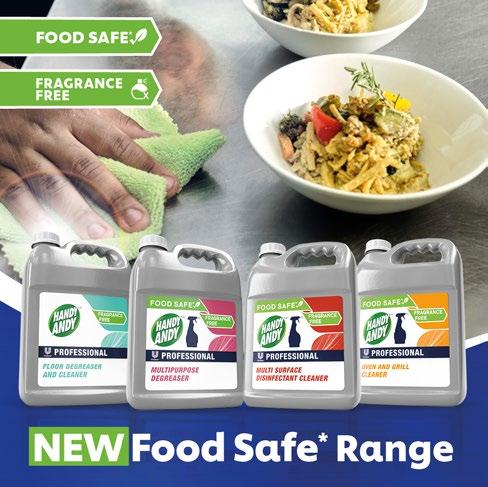
14 African Cleaning Review September/October 2023

The all-important public washroom experience
Africa’s tourist hotspots appear to be sadly lacking in public toilets. This was the conclusion reached in a recent poll of 69 tourist destinations around the world. Johannesburg came out second worst in the survey with only 0.01 public toilets per square kilometre. And bottom of the list in 69th place was Cairo, which offered a mere 0.002 toilets per sq. km.
Carried out by UK-based washroom supply company QS Supplies, the survey revealed that other African destinations fared little better with Cape Town ranking 44th on the list and Marrakech 48th. So why is toilet provision so badly lacking in Africa?
True, public washrooms can be expensive to run as well as be timeconsuming to maintain and hard to monitor. Essential supplies of soap and paper tend to run out quickly in public facilities. And washrooms are frequently the targets of vandals and
are often used for shady activities such as drug-taking. Therefore, they are commonly perceived as being unpleasant, down-at-heel facilities and this tends to deter people from visiting those few washrooms that remain available.
But public toilets are a necessary part of daily life as well as being crucial for tourism. Visitors might be forced to curb their stay in a city where the toilet provision is either poor or nonexistent, for example. And this will have a negative impact on that destination’s food and retail profits.
Municipalities need to come up with ways of making public toilets easier to maintain, harder to vandalise and cheaper and easier to run. All dispensing systems should be purposedesigned to reduce the need for frequent maintenance checks while also helping to prevent abuse. They must have a high capacity while also being
robust and lockable, and they should help to curb over-consumption to bring down costs.
For example, the Tork SmartOne© toilet roll dispenser reduces consumption by up to 40 percent1 compared with jumbo roll dispensers, since the system delivers one sheet of paper at a time. The SmartCore© core removal system enables fast and easy refilling by the cleaner, which eases the maintenance burden. Plus, the sturdy dispenser has no openings or crevices that might be used for storing drug paraphernalia.
Public washrooms also need to offer a long-lasting supply of soap to facilitate good hand hygiene. But bar soaps will quickly become cracked and dirty, while bulk fill soaps need to be manually refilled – a task that can be both messy and time-consuming. Soap should therefore be supplied in cartridges that can be snapped quickly into place.

16 African Cleaning Review September/October 2023
feature cleaner, greener, smarter washrooms
A recent poll ranked Johannesburg and Cairo as the two tourist cities with the poorest washroom access. Tork manufacturer Essity looks at the importance of public washrooms and considers how to make them cheaper to run and more pleasant to use.
Tork Foam Soaps are supplied in sealed cartridges that cater for up to 1,650 visitors, helping to reduce consumption by up to 50 percent compared with a liquid refill of the same size. This helps to prevent runouts, while the fact that the sealed cartridge can be replaced in seconds speeds up the task of refilling for the cleaner.
A high-capacity hand towel dispenser is a good solution in a public toilet because it helps to keep the number of refill checks to a minimum. The Tork PeakServe® ContinuousTM Hand Towel Dispenser caters for over 1,000 washroom visitors between refills – 600 more than most dispensers. The towels are divided into bundles and a new bundle may be inserted into the unit at any time. The dispenser has been designed to dispense sheets of paper singly to avoid excess use and keep down costs.
feature cleaner, greener, smarter washrooms
There are other measures that authorities can adopt to improve efficiency and reduce bills in the public washroom. For example, automatic lights and taps that ‘sense’ when people need to use them can help to lower electricity and water bills. Continuous flooring and wall coverings will be easier to keep clean than tiles with grout lines. Sensor-operated taps will require less cleaning than manual versions because they attract fewer fingerprints.
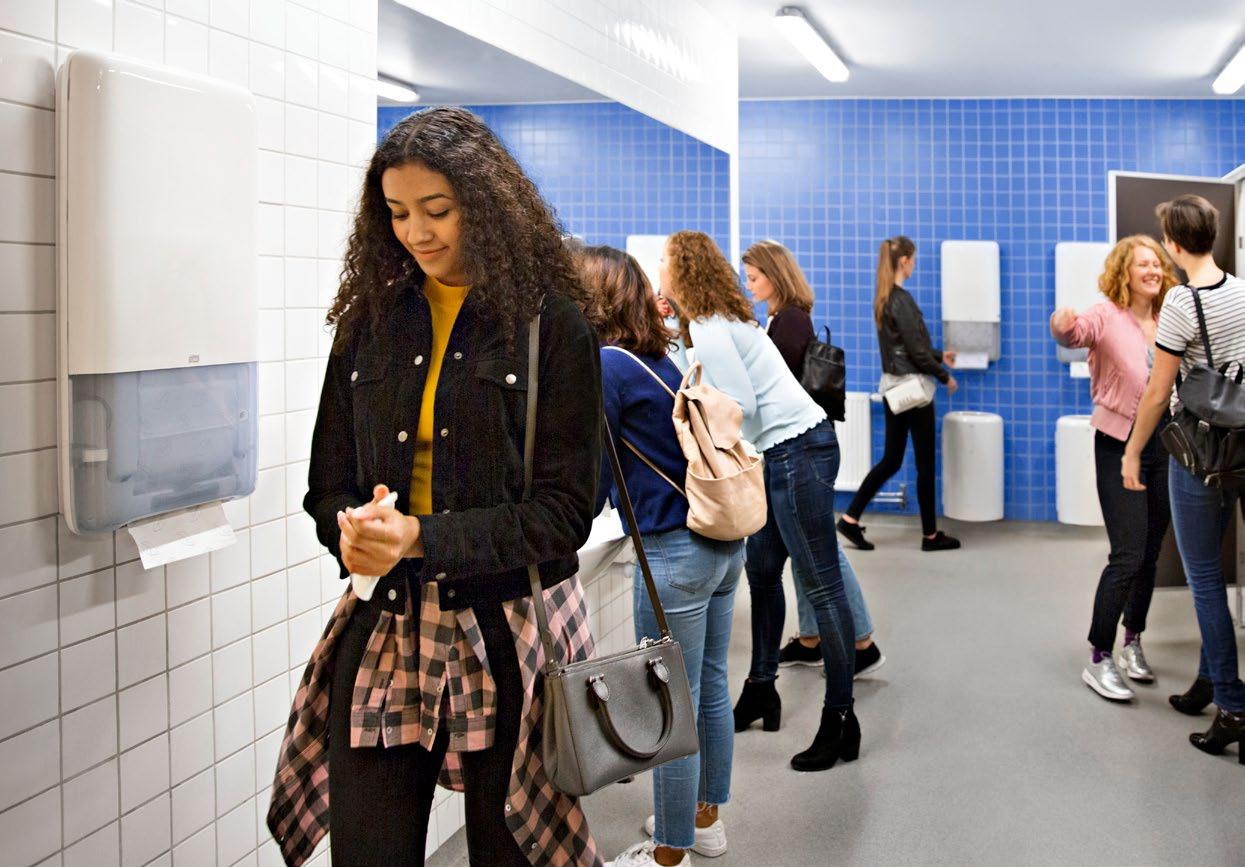
Public washrooms might be considered something of a luxury on a continent where many communities have no toilets at all. Statistics show that 75 percent of people living in rural areas of Burkina Faso and 96 percent in Eritrea have no toilet access, while more than 70 percent of those living in urban settings in Nigeria have no flushing toilet at
home and no access to a shared facility. But public toilets have an important role to play for anyone visiting a park, town centre or other amenity. So municipalities need to design, equip and maintain these facilities intelligently to make them cost-efficient to run, quick to maintain and pleasant to use.
Reference:
1 Statistics from internal research on 7,729 users in Europe. Traditional maxi jumbo dispenser vs. Tork SmartOne® Twin Mini dispenser. Reduction accounted in square metre used per visit.
The Tork brand offers professional hygiene products and services to customers ranging from restaurants and healthcare facilities to offices, schools and industry. Products include dispensers, paper towels, toilet tissue, soap, napkins, and industrial and kitchen wipers. For more information, visit: www.tork.co.za
The Tork PeakServe®
ContinuousTM Hand Towel Dispenser caters for over 1,000 washroom visitors between refills – 600 more than most dispensers. The towels are divided into bundles and a new bundle may be inserted into the unit at any time.
17 African Cleaning Review September/October 2023
A high-capacity hand towel dispenser is a good solution in a public toilet because it helps to keep the number of refill checks to a minimum.
Eliminating use of single-use plastics in washrooms



Over the past 3 years, the Hyvest Group has made it our mission to reduce our impact on the environment. Why you may ask? If manufacturers don’t start making changes from a production viewpoint, how can customers and end users take up the same banner and apply it to their own lives?
The Hyvest Group has made a few small changes that have had a substantial impact. The next time you visit a washroom, take a moment to think about how many of the products are packaged in plastic. You may think it does not amount to much but let’s dive a little deeper. When you enter a washroom, you would prefer it to smell clean and fresh or to have a fragrance that does not smell like a public washroom. For this to happen, fragrance must be introduced, and these fragrances are almost always packaged in aerosol canisters, and the fragrance cans have plastic lids where 100 percent of the time these are immediately discarded. The Hyvest Group pondered this issue and

realised there must be a better solution, and with this in mind, our ‘Eco cap’ concept was born – a recyclable cardboard cap that is biodegradable and reuseable, reducing the use of single-use plastics on packaging of our fragrance cans by 4,511 kg per annum. Another significant change the Hyvest Group implemented has been the packaging of the 2-ply laminate paper used in our paper towel dispensers as 40 percent of this product is packaging, which is immediately discarded. This is one of the reasons why Hyvest came up with the concept of a paper wrap for the 2-ply laminate paper towels. The wrap is biodegradable and now also packed in cardboard. More than double the proportion of paper and cardboard packaging
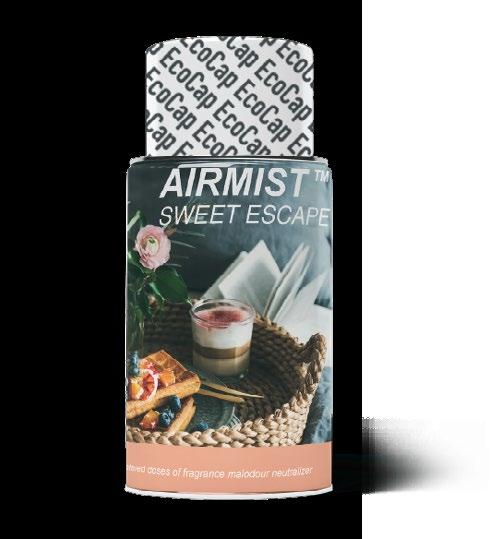
18 African Cleaning Review September/October 2023 feature cleaner, greener, smarter washrooms
For more information regarding advertising / editorial / digital packages, email: nande@cleantex.co.za www.africancleaningreview.co.za Advertise in the primary African trade magazine for the commercial cleaning and hygiene sectors. Reach your target market cost-effectively with a direct link to end-users, building service contractors, facility management and key institutional segments.
feature cleaner, greener, smarter washrooms
is sent for recycling (82.6%) compared to the rate for plastic packing (40%). This equates to a staggering 20,674 kg reduction of single-use plastics per annum.
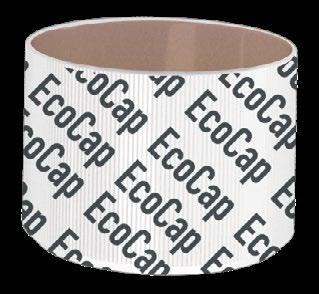
Worldwide, companies produce 300 million tons of plastic each year, half of which is single-use plastic, and in the washroom the number of products packaged in single-use plastic items is astounding. The pumps used in seat sanitiser and soap dispensers are typically for single-use applications only, together with the attached pouch.
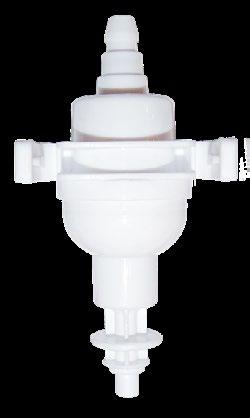
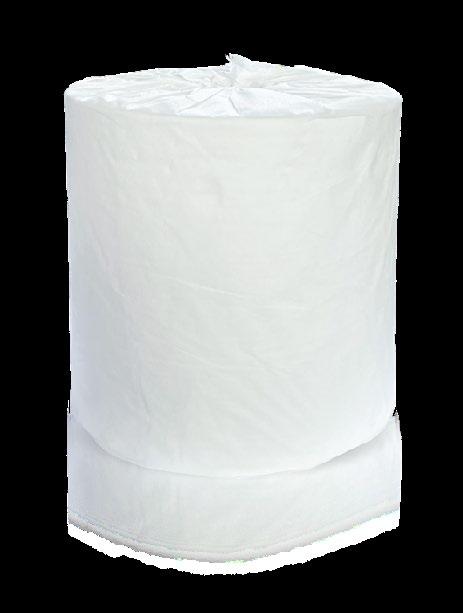
The Hyvest Group has, however, changed this. The soap and sanitiser pumps are reusable, extending the life of the pump and ensuring that they do not end up in a landfill after a single use, and a further reduction of 10,743 kg of single-use plastics is achieved per annum.
Why is the Hyvest Group so passionate about eliminating single-use plastics originating from washroom products? The simple answer is this, if manufacturers don’t start to make minor changes that have a major impact, then who will?
For more information, visit: www.hyvest.co.za

Worldwide, companies produce 300 million tons of plastic each year, half of which is single-use plastic, and in the washroom the number of products packaged in single-use plastic items is astounding.
Advanced washroom technology delivers hygiene and more
In the wake of the global coronavirus pandemic, one thing is clear: Hygiene is king. And there seems to be little debate that today’s daunting demand for heightened hygiene will remain long after the pandemic itself has waned. For businesses, that means the ability to improve hygiene and protect the health and well-being of facility occupants is critical to their survival. This puts a great deal of pressure on facility managers and building service contractors, who must identify cleaning and maintenance solutions that will lead to success, according to GP PRO’s Michael Slawson.
Fortunately, advanced smart washroom technologies are available that leverage the Internet of Things to create data-driven facility management solutions. Some of these solutions monitor, analyse and measure information that directly impacts hygiene – and a great deal more.
Five timely benefits of smart washroom solutions that can help facilities survive and succeed are:
1. Heightened hygiene
2. Improved sustainability
3. Enhanced user experience
4. Reduced staff burnout
5. Elevated confidence
Heightened hygiene
Smart washroom solutions help improve hygiene for both washroom users and cleaning staff. By monitoring
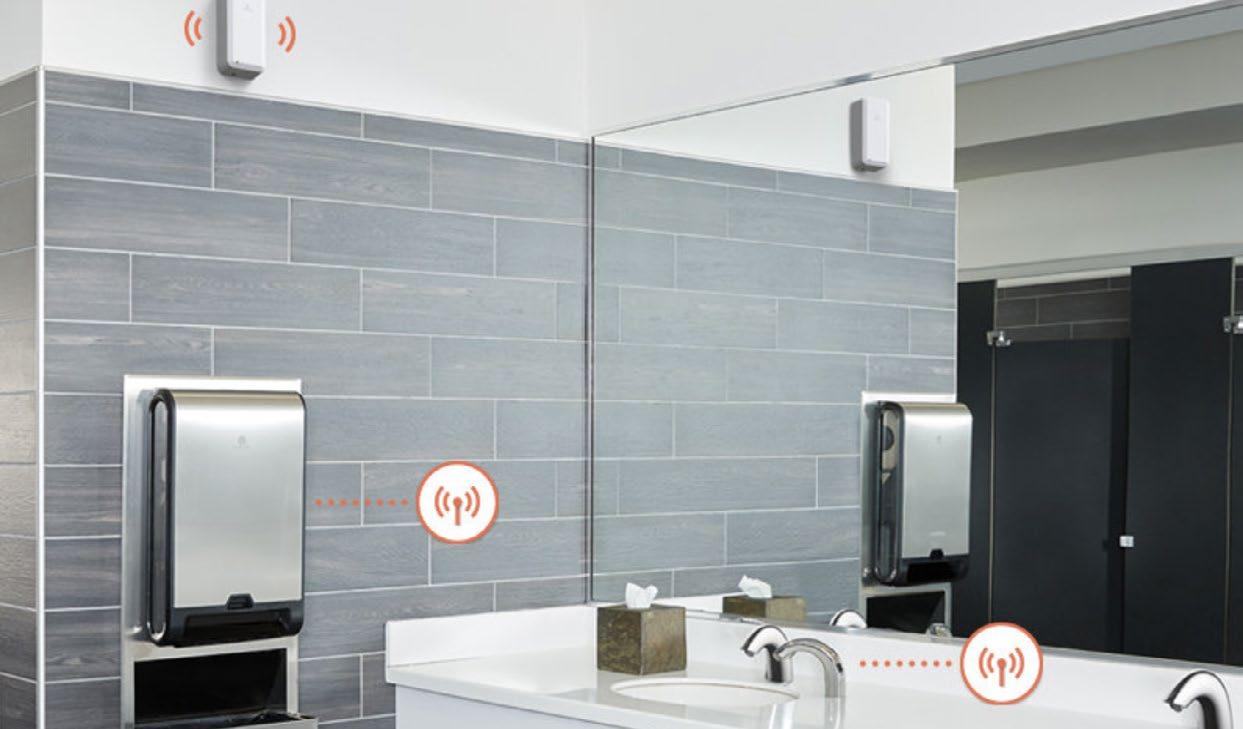
supply levels and alerting cleaning staff when levels are low, smart technologies help ensure soap, sanitiser and towel dispensers are adequately stocked so users can properly wash, sanitise and dry their hands. Cleaning staff can spend more time cleaning and sanitising additional spaces because they aren’t constantly running in and out of washrooms to check supply levels.
By ensuring touchpoints like doorknobs, tap handles and toilet paper dispensers are cleaned and sanitised regularly, smart solutions help reduce the number of germs on surfaces and protect washroom patrons. By refilling and sanitising only when necessary, cleaning staff encounter fewer touchpoints, reducing their own exposure to germs.
Improved sustainability
Over the past two decades, information has become readily available about the harmful effects of a wide range of products on the environment. At the same time, concern has grown about the depletion of the earth’s natural resources. In response, many facilities have gone to great lengths to implement sustainable business practices.
Smart washroom solutions can help facilities improve hygiene while simultaneously advancing sustainability. By implementing technology that alerts cleaning staff to refill dispensers only when needed, facilities reduce product waste. And by monitoring flush valves and taps to help ensure these fixtures are operating optimally, facilities reduce their water usage.
20 African Cleaning Review September/October 2023 feature cleaner, greener,
washrooms
smarter
Enhanced user experience
Imagine a washroom with adequately stocked soap, sanitiser, toilet tissue and paper towels; fully functioning sinks, toilets and urinals; and clean and sanitised counters, handles and floors. Such a clean, well-maintained, fully functioning washroom is critical to a positive user experience, and smart washroom solutions can help deliver that positive experience every time.
Solutions with sensors and monitoring capabilities maintain a proper balance between product supply and demand so users don’t experience outages. They also help facilities quickly address water leaks, clogs and faulty flush valves so washroom disruptions are minimised. Technologies that collect customer feedback and determine patron satisfaction levels help facility managers determine if the washroom is performing as it should be and can quickly alert cleaning staff of an issue. Together, these smart systems can
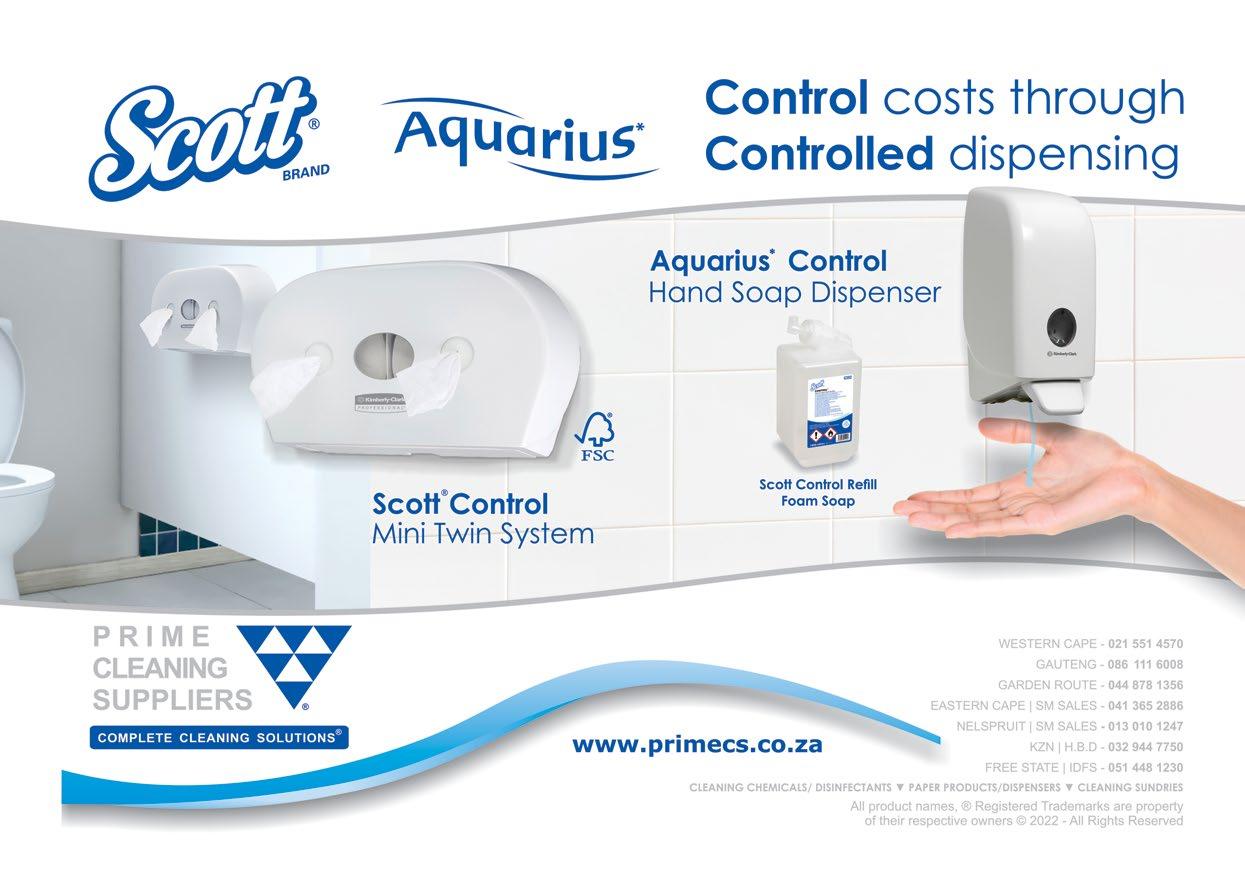
feature cleaner, greener, smarter washrooms
provide a healthier and elevated user experience.
Reduced staff burnout
It’s quite likely that facility staff are feeling a bit burned out right now. Since news of the coronavirus pandemic first broke, facility managers and cleaning staff have been investing an inordinate amount of time and effort to keep facilities clean and safe.
Some may be manually creating and updating cleaning and sanitising checklists and keeping close tabs on cleaning staff to ensure tasks are completed. Others have seen their to-do list grow exponentially as they are cleaning more surfaces and doing so more frequently. The mental and physical toll is extreme.
Smart washroom solutions, though, allow for smart cleaning. Checklists and task alerts are automated, performance is monitored, and results are measured, saving time, energy and effort for all involved.
Elevated confidence
Smart solutions take a wide array of cleaning, sanitising and maintenance tasks and create a systematic and methodical approach to organising, performing, monitoring and measuring them. This streamlined, automated approach ensures everyone involved in facility maintenance has a clear understanding of tasks and expectations.
As cleaning and maintenance tasks are completed, they can be monitored and measured in real time. As a result, facility managers can be confident in the quality of work performed and that, as a result, the health and well-being of building occupants are protected.
Michael Slawson is vice president and general manager of connected solutions for GP PRO, a division of Georgia-Pacific and a leading provider of advanced dispensing solutions for commercial facilities. For more information, visit: www.gppro.com.
Cleaning for health and safety in gym locker rooms
Appropriate locker room cleaning is vital for health and safety. Warm, humid and busy spaces, locker rooms are the perfect petri dish for a variety of dangerous pathogens to thrive. Without proper cleaning strategies in place, these pathogens will grow and spread, putting athletes and everyone else at risk. Here follows the best procedures and tools for effective locker room cleaning for health and safety.
Risks of dire locker room cleaning
Locker rooms are necessary for any athletic programme. People need a facility to change, stow their clothes, and (hopefully) shower. But that warm, constantly damp environment is very hospitable to all kinds of nasty bugs. One of the most dangerous pathogens found in locker rooms is MRSA. This potentially deadly staph infection is hard to cure because of its resistance to some antibiotics. But it is not the only locker room threat. Other unpleasant microbes include: Ringworm, also known as tinea, influenza, HPV, norovirus, E. coli, Streptococcus, Candida and Klebsiella. Some locker room dangers have nothing to do with microbes. Consistently wet floors also present slip-and-fall risks. To combat this threat, textured tiles and grout are often used for locker room floors. This combination provides traction, making the floor safer to walk on. But grout is porous, creating great hiding places for pathogens to grow and thrive. Removing soil from grout can be very challenging.
Procedures for effective locker room cleaning
Locker room cleaning should take place every day the facility is used. An article from Facility Executive by
Gordon Buntrock provides some great tips on how to be proactive about the job. For instance, he advises starting in the cleanest place and moving to the dirtiest to help avoid crosscontamination.
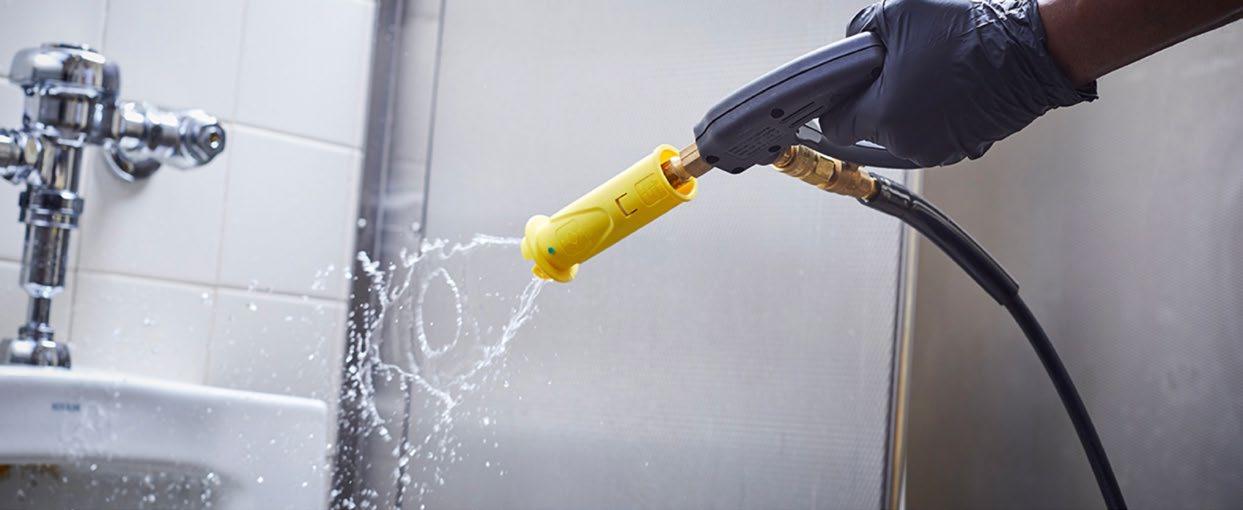
Buntrock also says: “Quality locker room cleaning for schools should use EPA-registered, hospital-grade disinfectants to clean all touch points and floors”. He suggests finding EPAregistered disinfectants that leave less residue but still provide superior cleaning required for grouted surfaces.
Speaking of grouted surfaces, that infamous mashup of unpleasant locker room smells comes from protein-based soils that often start in the grout and around floor drains and other surfaces. For the floor drains, Buntrock suggests applying enzyme-based chemicals now and then to break down those proteins and get ahead of the stench. Fully removing soils from the grout will also help stop odours before they build up.
Tools for better locker room cleaning
Scheduling maintenance for high-traffic locker rooms can be tricky. Always doing the job overnight means the space is clean and safe at the start of the day. But what about the people who show up later? And what about all the soils users are tracking through the rest of the facility?
This makes day-cleaning of locker rooms important for safety. Analysing usage trends to identify peak times can be helpful in scheduling that daily cleaning. Using state-of-the-art tools can help as well. According to Rink Magazine, a trade publication for the Ice Rink Association, No-Touch Cleaning® systems from Kaivac are the preferred tools for locker room cleaning.
This tool, paired with the appropriate cleaning chemical, blasts dirt, soils and dangerous microbes from locker room surfaces to the floor. The machine’s powerful vacuum sucks up the slurry, completely removing the mess. The room is clean, dry and safe. Even more impressive, cleaning staff never have to put themselves at risk by touching a dirty surface.
Kaivac cleaning machines not only work wonders in washrooms but have been enhanced to tackle just about every surface and space throughout a building. Floors, walls, classrooms, stairwells, kitchens, hallways and more are all effectively and efficiently cleaned and disinfected with the company’s No-Touch Cleaning systems. Consequently, many customers now use them rather than auto scrubbers, carpet extractors, dry and wet vacuums, mops and buckets. Kaivac equipment is distributed in South Africa by Goscor Cleaning Equipment, www.goscorcleaning.co.za
22 African Cleaning Review September/October 2023 feature cleaner, greener, smarter washrooms
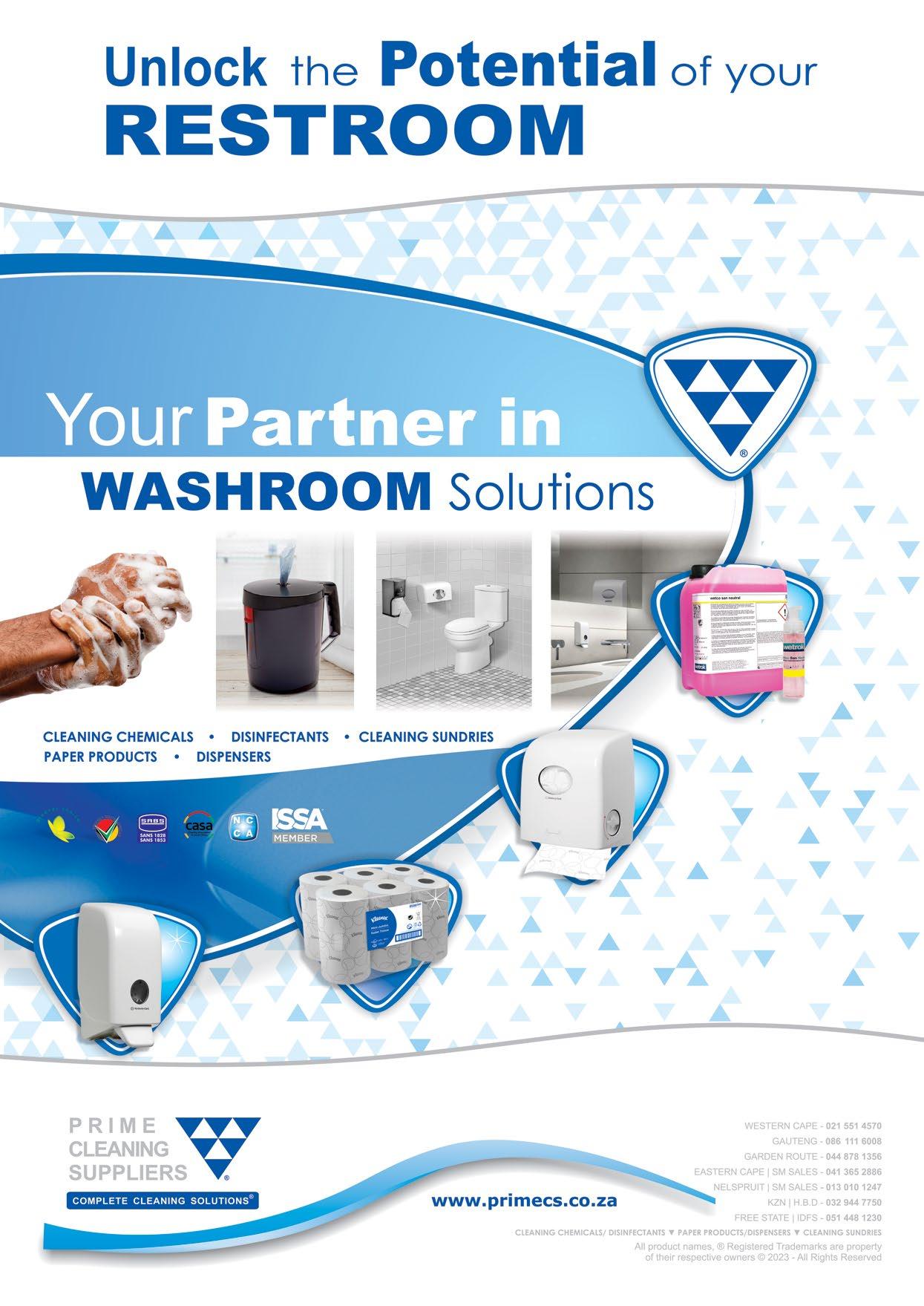
facilities management review
Putting the ‘AI’ in air freshener solutions
We’ve all seen the news, headlines from that way-too-dramatic presenter on the BBC, Sky News, etc. about how artificial intelligence (AI) is revolutionising various industries, making our lives more convenient and efficient (apparently). At what expense, though, and can literally anything be made with AI? If you look at AI with ChatGPT particularly getting a big mention in the press of late –AI in this field already existed in a form, long before even Google arrived, according to Matt
Wonnacott, founder of Ennovamark.
Now, in 2023, such is the interest in AI and ‘alarm’ that it could do more harm than good in the wrong hands, even the EU recently set out a charter, of sorts, to help mitigate any potential harm AI could pose in the future.

But what about AI used in the ‘right’ hands? We look deeper into how AI could make its way into the world of air care and air fresheners. Long gone are the days of just the ‘traditional’ air fresheners that caused a stink and a right mess in its trail. Is AI stepping in to create a more personalised, eco-friendly (this is another bone of contention – don’t get us started on this!) and smart solutions that cater to our specific needs and preferences? Or has ‘the AI air freshener of tomorrow’ revolution already arrived?
Commercial air freshener systems with ‘Smart’ programming
In the washroom especially, businesses need products that are effective, both in cost and performance. Washrooms are often exposed to ‘cost sensitivities’ more than other areas of a building. So it pays for air care manufacturers especially, to provide products and solutions that deliver on these two aspects, with or without AI.
It could be argued that the air care industry has been using AI for many years, already. If you look at the common metered air care systems available today and even 10 years ago, perhaps a form of AI has already been well established. Users of these scented products can set when the systems operate or spray – to meet their or their customers preferences –and also ‘switch off’ when the building is unoccupied, thus saving on battery and fragrance consumption, which in turn saves money. Just set and go and trust the pre-programming to do its job.
There are also air fresheners in both the commercial and retail sectors that offer motion sensing too. Only spraying when the dispenser senses movement in a particular space.
Personalised scenting experience
Gone are the days when consumers had to settle for that spritz of overpowering citrus that didn’t necessarily appeal to their individual tastes. With AI, air fresheners can now offer a personalised scenting experience. Advanced AI algorithms can analyse data from user preferences, to recommend and create bespoke or customised fragrances.
Imagine having an air freshener that adjusts its scent intensity based on your mood or the time of day, offering a refreshing aroma to uplift your spirits on those dreaded Monday mornings and a soothing lavender scent to relax you in the evening after you’ve already had enough of the work week. With AI, air fresheners can cater to our preferences, making our living spaces more comfortable and enjoyable.
Environmentally ‘conscious’ solutions
The impact of traditional air fresheners on the environment has long been a concern due to harmful chemicals, levels of VOCs and excessive waste that they previously produced. AI is playing and can play a significant future role in developing what some would consider ‘eco-friendly’ air fresheners that prioritise sustainability. Machine learning systems, or models, can assess and optimise the ingredients used in air fresheners, ensuring they are more environmentally friendly.
Furthermore, AI can assist in designing air freshener dispensers with smart sensors that detect air quality and release scents only when necessary. By reducing unnecessary emissions, AI-powered air fresheners can help
24 African Cleaning Review September/October 2023
Image by rawpixel.com
manufacturers create a cleaner and greener future than the traditional ways of scenting have provided in the past.
Smart, integrated air fresheners for the home
The rise of smart homes has transformed the way we interact with our living spaces. Got the Ring doorbell? The security system that shows you your house from a million angles? AI-powered air fresheners are no exception either, as they can and will likely integrate with smart-home ecosystems seamlessly. These intelligent air fresheners can be controlled remotely via smartphones or voice-activated virtual assistants, adding convenience and ease to our lives.
For instance, AI can enable air fresheners to sync with our daily routines, knowing when we arrive home or when we’re about to wake up, and automatically adjust scent levels to suit our needs.
Data-driven air quality improvement – an all-in-one air care system
AI’s prowess and speed in data analysis empowers air fresheners to be more than just a device that pumps out great fragrances. These smart devices can now gather data on indoor air quality, such as pollutants, humidity levels and temperature. By analysing this data, AI-powered air fresheners can provide valuable insights into air quality trends and possible sources of contamination.
Moreover, AI algorithms can develop strategies to combat specific air quality issues, suggesting appropriate scents or partnering with other smart devices like air purifiers to tackle pollutants more effectively.
As we embrace the possibilities of artificial intelligence, the air care industry has already undergone a transformative change. Like most things in life, you need to take a peek at the past to know where the
future lies. We tip our hats to the manufacturers who have already created AI, in essence, with the remote and tailored programming already offered.
With advancements in AI technology, we can look forward to a future where our spaces are improved with scents tailored to our preferences, contributing to a healthier and happier lifestyle. As these innovations continue to evolve, the next generation of air fresheners will build on the great work that has already been created before them to advance the scenting experience further.
Matt Wonnacott is the founder of Ennovamark, an agency created to assist air-care, hygiene and washroom technology brands and businesses to develop effective innovations and marketing strategies. Matt’s two decades of experience in the industry enables him to support clients with outstanding and innovative ideas.
Driving continuous improvement of sustainability skills and knowledge among building professionals
Three leading stakeholders in the built environment have come together to launch the Pact for Skills for Sustainable Facilities. IFMA EMEA, EU.BAC and REHVA have long championed the importance of upskilling the existing building workforce and effectively training the next generation of building professionals. The recent announcement ensures that as the European Union continues to develop a text road map to achieve energy and sustainability goals, training for building operations and maintenance continues to be a priority.
Operations and maintenance account for more than 85 percent of a building’s cost over its useful life. It is during the operational phase of a building’s life cycle when energy savings are achieved and sustained. As demand for built environment efficiency evolves, so too does the skill set required to operate and optimise facilities and the systems that support them. Managing Director of the International Facility Management Association (IFMA) EMEA Lara Paemen said: “Continuing education has always been important to building sector professionals; but even more so now amid rapidly advancing technologies, elevated focus on occupant well-being and a global urgency to reduce buildings’ environmental impact. Knowledge and skills requirements are expanding for all professionals who design, construct, manage and maintain the built environment. Ensuring the industries we represent have the training, resources and workforce necessary to meet increasing demands for sustainable operations takes a collaborative effort between organisations dedicated to achieving the same goals. The IFMA EMEA, EU.BAC and REHVA partnership enables a higher level of support to our professional communities”.
The Pact for Skills for Sustainable Facilities will enhance:
1. Continuous improvement of skills and knowledge: The signatories commit to continuous learning and improving the skills and knowledge of sustainable operations professionals through ongoing education, certification and training.
2. Awareness about the role of building operations in achieving designs for performance.
3. Development of Pan-European resources to upskill professionals currently working in the building environment.
For more information about the European Commission’s Pact for Skills, visit: pact-for-skills.ec.europa.eu/index_en.
25 African Cleaning Review September/October 2023 facilities management review
Cut energy costs through heat recovery
Waste-heat recovery is a significant opportunity for laundries to improve efficiency and reduce energy bills. Many commercial laundries are turning to such heat-recovery systems to capture the thermal energy from waste heat and reuse it to preheat freshwater or incoming air efficiently. The most common heat-exchanger systems that meet the specific requirements for laundries are water-to-water and air-towater heat exchangers.
In this abridged article, Christeyns takes a closer look at the efficiency of water-to-water heat exchangers, the most suitable designs for laundries, the benefits of implementing such systems, and how to maintain them for optimal performance.

Highly efficient heat transfer
In a typical water-to-water heat exchanger, freshwater flows in and circulates around the hotter wastewater that flows out. The wastewater transfers its thermal energy to the freshwater through
the interior walls, heating the freshwater and cooling the wastewater as it exits the unit. The average range of efficiencies of such systems varies between 50 and 80 percent. The efficiency is the result of the flow settings.
There are three primary flow settings:
• Parallel flow: the two fluids enter at the same end of the heat exchanger and flow in the same direction, parallel to one another. In this design, the temperature differences are large at the inlet, but the fluid temperatures will approach a similar value at the outlets.
• Counterflow: the two fluids enter at opposite ends of the heat exchanger and flow counter to one another. In this design, the temperature differences are less but are more constant over the length of the exchanger. It is possible that the fluid being heated may leave the exchanger at a higher temperature than the exit
temperature of the heating fluid. This is the most efficient design because of the higher temperature differential over the length of the exchanger. Both Christeyns’ Heat-X Energo and Heat-X rotor are characterised by this counterflow.
• Crossflow: the two fluids flow perpendicular to one another.

How to select the correct waterheat exchanger for your laundry
There are several different types of water-to-water heat exchangers available for waste-heat recovery. These include pipe-in-pipe, shell-andtube, disc, and printed circuit heat exchangers. However, the main heat exchanger types that are applied in the laundry industry are shell-and-tube and disc heat exchangers.
Shell-and-tube heat exchangers are the most common design in laundries. They consist of a parallel arrangement of tubes in a pressurised shell. This allows the tubes to conduct heat transfer under higher pressure than some other designs.
26 African Cleaning Review September/October 2023
laundry review
Photo by Gianluca D’Intino on Unsplash
Also, in laundries, size and shape are important factors because space limitations may dictate positioning and footprint requirements. This makes shelland-tube designs more suitable than other heat-exchange systems.
Disc heat exchangers are also a good fit for laundries. They contain a rotating hollow disc section placed in a shell. Fresh water flows inside the rotating discs, while wastewater flows around the discs. This design is suitable for laundries where the wastewater is highly soiled. The surface design of the rotor discs ensures that the water flowing around them is always in turbulent motion, which prevents sedimentation of calcium and dirt particles. In that way, they do not need periodic cleaning.
Benefits of implementing a water-towater heat-exchange system in your laundry
The main benefit of installing a heatrecovery system in your laundry is that it will help you reduce your energy consumption and save money.
For example, Christeyns’ shell-andtube Heat-X Energo allows an energy
reduction of more than 50 percent in the washing process. Plus, as the waste heat is used to preheat the rinse water, textile temperatures are higher, leading to less moisture retention in the linen. The result? Additional savings of up to 20 percent in the drying and finishing process.
Moreover, implementing a heat exchange system can also help extend the lifespan of your equipment by reducing strain on mechanical parts due to reduced operating temperature.
Finally, such a system can help you comply with environmental regulations regarding emissions reduction. Especially for commercial laundries that use city sewers for their wastewater, water-to-water heat exchangers may be beneficial to cool their wastewater to meet local regulations.
Maintenance requirements for optimal performance
Thorough maintenance of heatexchange systems can deliver quick wins by ensuring the equipment is performing to its potential. Much of this effort is aimed at countering the effects
of fouling. In general, fouling occurs when particles accumulate on heatexchanger surfaces and prevent heat transfer and restrict fluid flow. To stop the precipitation of particles, chemical additives can be used. Additionally, simple preventative maintenance activities such as flushing or repairs that require the tube bundle to be removed from the heat-exchanger shell for cleaning, can help prevent fouling.
Keep the heat in motion
There are several different types of water-to-water heat exchangers available for waste-heat recovery systems in laundries. Each type has its own advantages and disadvantages that should be considered when selecting which one is best suited for your laundry operations.
Christeyns is well known for premium chemicals, reliable equipment and flexible, customised service. The company’s portfolio includes hygiene solutions for professional textile care, food processing and retail, the professional cleaning industry and the medical and life sciences sectors.
New format for textile care expo in France
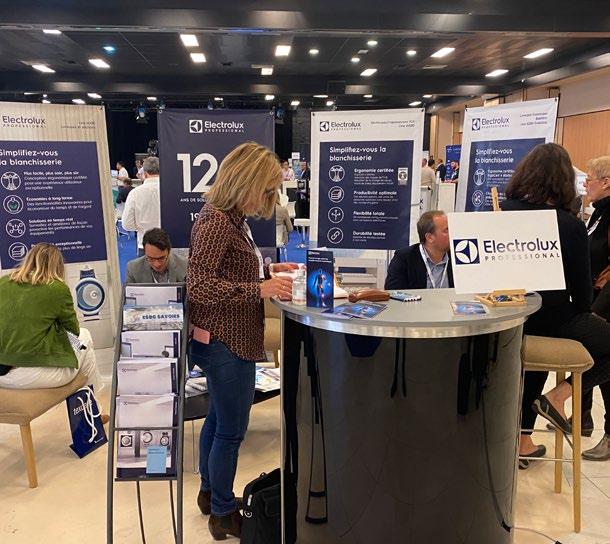
Texcare France will be held from Saturday 25 to Monday 27 November 2023 in a new national format at the Porte de Versailles exhibition centre in Paris, according to a news release. After four regional forums in Nantes, Marseille, Bordeaux and Lyon in 2021 and 2022, the next gathering of the textile care industry is set for November 2023 in Paris as a national trade show. Following the takeover of Jet Expo in 2018 by Messe Frankfurt France, the show, renamed to Texcare France, will stage its first edition in Hall 2.1 of Paris Expo Porte de Versailles. This event will bring together all the professionals of the textile care industry: on the one hand the suppliers of machines, products and services and, on the other hand, the customers such as dry cleaners, laundries, textile rental and cleaning, textile services, on-demand services, hospitals, health and social institutions, hotels and restaurants, caretakers, communities, etc. The three days of the exhibition will be complemented by a programme of conferences, round tables and workshops focusing on the latest news, innovations and challenges facing the profession.
For more information about the exhibition, visit: www.texcare-france.fr
27 African Cleaning Review September/October 2023
laundry review
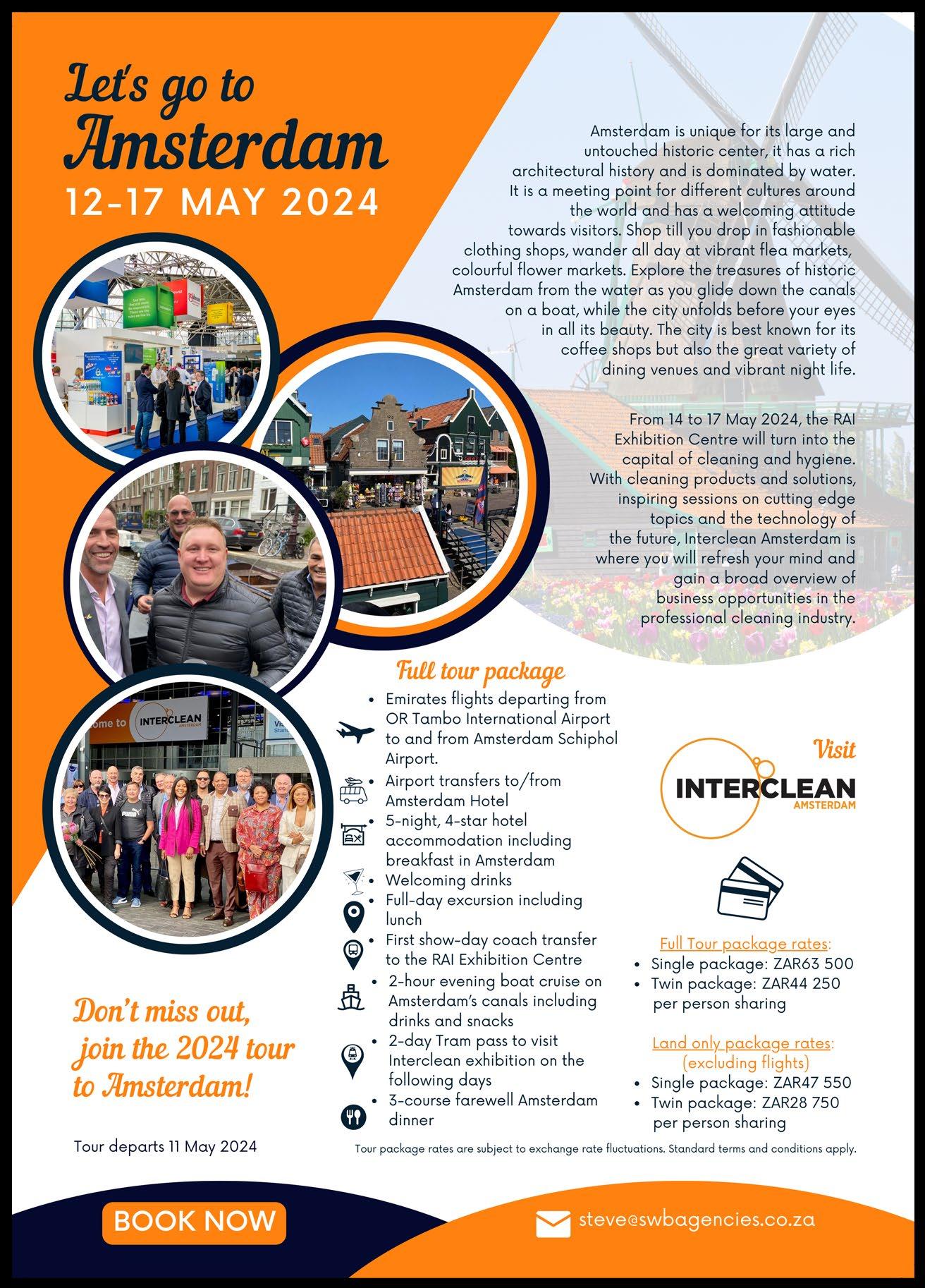
Green Cleaning Movement leader addressed African Summit
The 3rd annual Cleantex Executive Summit specifically developed for cleaning professionals in Africa took place on 7 September 2023 at the Lagoon Beach Hotel, Cape Town, South Africa.
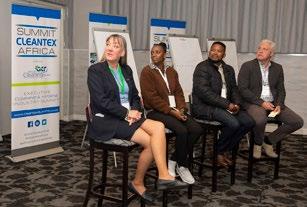
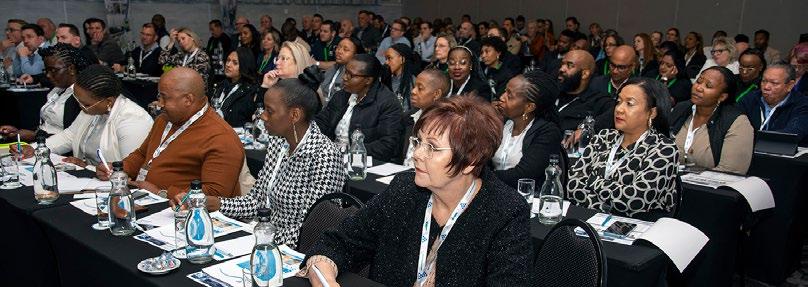
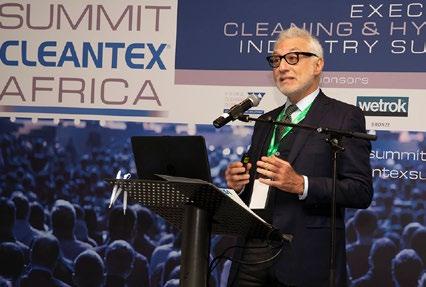
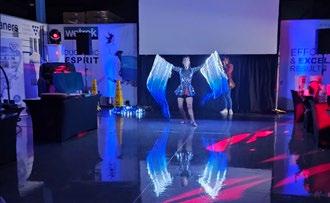
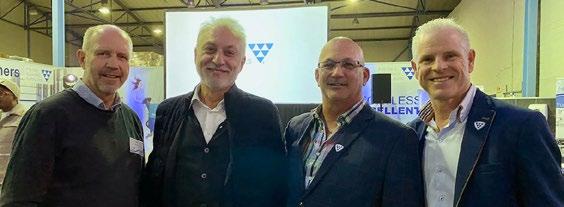
This African summit aimed at professional cleaning executives offered an educational and networking experience including a niche expo that afforded delegates the necessary knowledge to build their company’s vision for success while mingling with like-minded business executives.
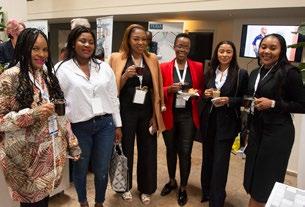
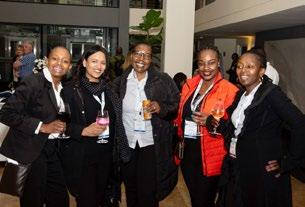
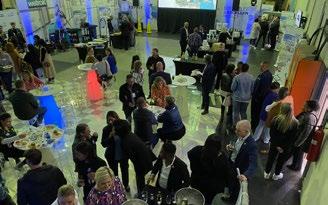
Carefully selected executive
sessions, presented by subject matter specialists, addressed pertinent business topics such as leadership, strategic management, customer experience strategy, selling at your higher price, customer journey mapping, the essence of workplace teamwork productivity, sustainability in cleaning and a 100-year success story of the Worldwide Cleaning Industry Association, the ISSA, presented by ISSA EMEA Director Toni D’Andrea. A track on sustainability in cleaning offered delegates thought-provoking insights as presented by Steve Ashkin,
widely recognised as the ‘Father of Green Cleaning’. His vast knowledge and experience of sustainability and his efforts to move the global cleaning industry from green to sustainable clearly struck a chord with the more than 120 delegates at this year’s soldout Cleantex Executive Summit. To view more pictures taken at the Summit, visit: www.cleantexsummit.co.za.
The next African Summit is scheduled to take place during the Cleantex Africa 2024 exhibition, scheduled for 16–18 October in Johannesburg, South Africa.
Client open day in Cape Town
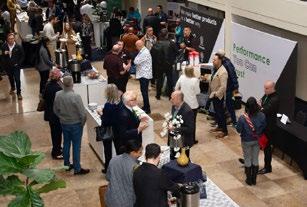
29 African Cleaning Review September/October 2023 people and events
Cleantex Executive Summit gold sponsors Prime Cleaning Suppliers (PCS) held its customer open day in Montague Gardens, Cape Town the Friday following the summit. Entertainment during the day included a dance and light show depicting the company and brand logos as well as entertainment by a comedian and a caricature artist at the KimberlyClark Professional display. Also attending the PCS customer open day pictured above from left: Johann van Vuuren (African Cleaning Review), Toni D’Andrea (ISSA), Trevor Longmore and Douglas Burger from PCS.
people and events
Professional body’s 4th AGM
The Professional Body for Environmental Hygiene (PBEH) held its AGM on 12 August 2023 at the offices of the NBC in Johannesburg. During the meeting opened by acting PBEH Chairman Arthur Bath, eight PBEH board members were elected, namely Lindiwe Maepa (Siyaya Skills Institute, Eastern Cape), Murray Gilson (LIVClean, KZN), Mathew Mathabatha (Limpopo
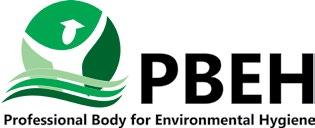
Supplement Traders), Verina O’Connell (Cleanpro Systems, Gauteng), Arthur Bath (Gauteng), Geoffrey Phiri (Cleaning Africa Services, Gauteng), Nerina Kloppers (Thlevo Services, Gauteng North), Patrick Madavhu (Tshipembe Projects, Gauteng). At the new board’s first meeting, Arthur Bath was elected chairperson, Patrick Nndwamato as PBEH director and Verina O’Connell as treasurer. The PBEH is a non-statutory
body, which recognises practitioners within the cleaning industry. The professional body is managed by a board, comprising of industry representatives and specialists who share a common goal: to promote excellence in the cleaning industry.
For more information, email: admin@pbeh.co.za
ISSA director visits major equipment importer
During his recent visit to South Africa, ISSA (Worldwide Cleaning Industry Association) director Toni D’Andrea paid a visit to Cleaning World, the country’s foremost importer of Italian cleaning equipment including brands like FIMAP and Eureka. Pictured here at the company’s new premises in Cape Town are D’Andrea (centre) with Cleaning World’s Alan Burton and Keelin Sloane.
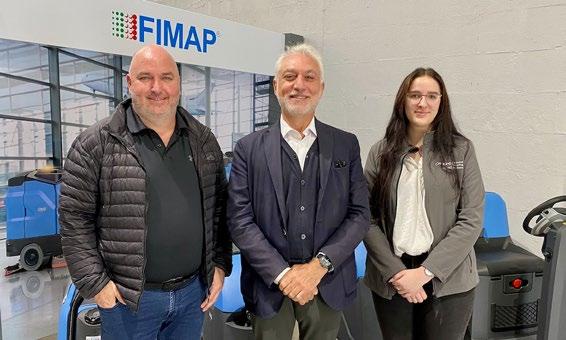
Women’s Day celebrated with artistic unmasking event
sexual assault and child abuse through innovative technological solutions. The partnership aims to provide access to crucial crisis intervention, advocacy, counselling and prevention education services for those affected by genderbased violence.
Empact Group displayed their commitment to promoting gender equality and responsible corporate practice when they held Women’s Day events at their offices in Gqeberha, Cape Town and Johannesburg on 4 August 2023. The events, themed ‘Woman You are Art. Unmask Your True Beauty’, celebrated the beauty and strength of women and took place in collaboration with Artist Proof Studios (APS) and Tears Foundation.
The Women’s Day celebrations focused on the power of art to inspire

and empower the women of Empact Group. Artist Proof Studio showcased their talented artists’ work, using storytelling as a medium to ignite creativity and motivation among Empact’s female staff. Attendees were encouraged to participate in canvas painting as a way to unite through art and express their individual or collective experiences.
Empact Group also teamed up with Tears Foundation, a non-profit and public benefit organisation dedicated to combatting domestic violence,
Alan Quinn, CEO of Empact Group, said: “We are delighted to celebrate Women’s Day by recognising the artistic beauty of every woman within our organisation. These events serve as a symbolic unmasking, encouraging our Empactors to shed the inhibitions and fears that hold them back and embrace their true beauty and prominence. We are committed to empowering our female staff and fostering an inclusive and supportive environment”.
Empact Group (formerly Compass Group Southern Africa) is a client-centric valuesbased solutions business focused on catering, cleaning and integrated facilities management, 100 percent owned by Thebe Investment Corporation (Pty) Ltd.
30 African Cleaning Review September/October 2023
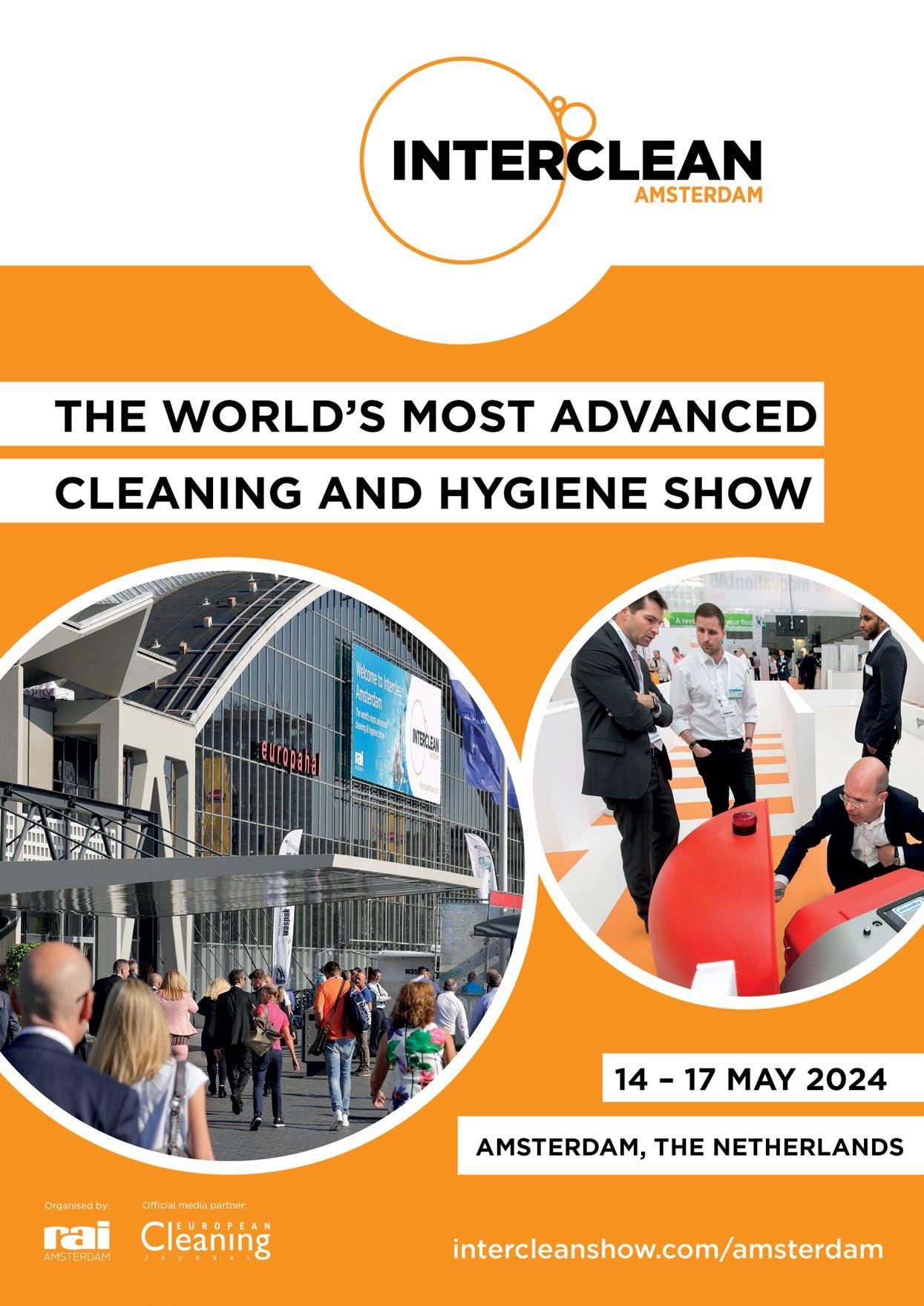
new products
Spunlace wipers for critical clean environments
Sellars Absorbent Materials, a Milwaukee-based manufacturer of wipes, absorbents and towel and tissue products, has added a new product to its TOOLBOX® line. Its S700 Spunlace wipers are durable, ultra-low linting and solvent resistant, making them ideal for use in critical clean environments, including aerospace, automotive, printing, manufacturing and medical.
According to Sellars, its Spunlace wipers are absorbent, have wet strength, are abrasion resistant and can withstand prolonged use with harsh chemicals and solvents. In addition, they do not contain binders or glues,
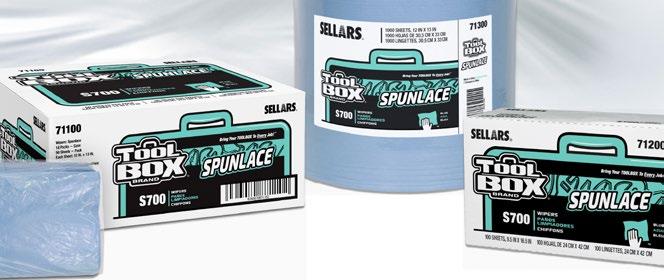
meaning they are contaminant free. That, coupled with their ultra-low linting quality, makes them an option to clean and wipe hydraulic equipment, electronics, printing presses, medical components and other sensitive elements.
The TOOLBOX S700 Spunlace wipers are available in smooth and creped textures in three different formats to
meet a variety of needs. Quarterfolds are convenient to stack on work benches and other flat surfaces. The interfold pop-up provides one sheet at a time to reduce waste and jumbo rolls quickly dispense wipers for high volume users.
For more information, visit: www.sellarscompany.com
Innovation comes in small packages, as Hako proves with its new Scrubmaster B5 scrubber-dryer. Featuring Hako’s state-of-the-art Delta Cleaning System, the Scrubmaster B5 sets a new benchmark for the cleaning of small and difficult-to-reach areas. At the heart of the Scrubmaster B5 is its ultra-flat triangular or delta-shaped cleaning head, which enables cleaning close to walls, deep into corners and under furniture and other barriers. With a ground clearance of as little as 120 mm, and extreme manoeuvrability, it effortlessly cleans areas previously only accessible with a hand mop.
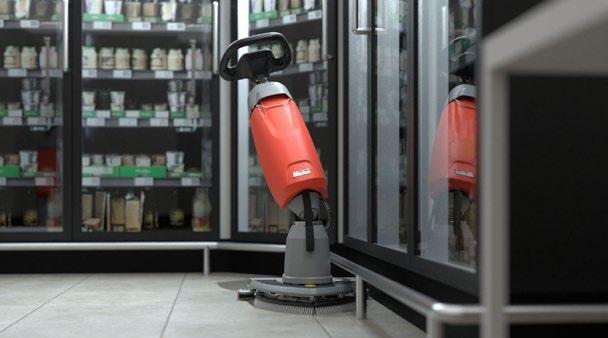
Design benefits include:
• Orbital scrubbing, for faster and better cleaning results.
• Neutral forward drive, so that little physical effort is required to approach narrow areas precisely and with ease.
• The operating handle effortlessly swivels in all directions thanks to the integrated relief spring and actuated ball, making it easy to clean under tables, counters and furniture.
• A clearly arranged control panel, which simplifies operation.
• The lithium-ion battery, which has a battery charge indicator, fits exactly on the delta shape of the cleaning head, and is changed quickly and without tools.
The Scrubmaster B5, which has a working width of 430 mm, is designed for low water and fuel consumption, reducing its environmental impact. Silent mode is available for those noise-sensitive areas.
For more information, email Wouter Niemann at BHBW: wniemann@bhbw.co.za

32 African Cleaning Review September/October 2023
Upright scrubber-dryer another first from Hako
r Absorbents – Oil/Chemicals
r Access Equipment/Ladders
r Air Cleaning Equipment/Air Duct
Cleaning/Indoor Air Quality Systems
r Air Filters/Air Purifiers
r Air Fresheners
r Anti-Stain Treatments
r Baby Changing Stations
r Bactericides
r Barrier Creams & Cleaners
r Biological & Enzyme Products
r Bird Repellent
r Bleaches
r Buckets/Wringers
r Carpet Cleaners
r Carpet Cleaning Systems
r Carpet Detergents
r Car Valet Products/Services
r Car/Truck Wash Systems/Services
r Catering Equipment Cleaning
r Catering Hygiene Products
r Ceiling & Wall Cleaning Equipment
r Chemical Dilution & Dispensing Systems
r Chewing Gum Removal
r Cleaning Chemicals/Agents & Consumables
r Cleaning Equipment/Cleaning Equipment Hire
r Cloths & Dusters
r Compactors/Compactor Bags & Tubing
r Computer & Cleanroom Cleaning
r Curtain Cleaning
r Customised Cleaning Solutions
r Descalers & Degreasers
r Detergents
r Dishwashers
r Dishwasher Dispensing Equipment
r Disinfectants & Sanitisers
r Disinfection/Decontamination/Fogging/ Sanitisation Services
r Dispensers/Dispensing Products
r Dosing Equipment
r Drain & Grease-Trap Maintenance
r Drain Cleaning Chemicals
r Drain Cleaning Equipment
r Dryers – Tumble/Clothes
r Duct & Gutter Cleaning
r Dust Control &/or Logo Mats
r Dust/Litter Bins
r Dustpans, Dusters & Brushes
r Escalator Cleaners
r Fabric Softeners
r Facial Tissue
r Facilities Management
r Floor Pads
r Floor Polishers
r Floor Scarifiers
r Fragrance Units
r Glass Cleaning Chemicals
r Glass & Aluminium Restoration
r Gloves – Disposable/ Plastic/Rubber/Latex
r Graffiti Removal Products
r Green Cleaning/Products
r Guest Amenities/Hospitality/Toiletries
r HACCP Cleaning Specialists
r Hand Cleansers & Protectors
r Hand Dryers (Air)
r Hard Floor Treatments
r Hazard Material – Disposal/Control/
Emergency Spill Response/Clean-up
r High-Pressure Cleaners
r Housekeeping – Carts
r Hygiene &/or Cleaning Consultants
r Hygiene Audits
r Hygiene Brushware & Consumables
r Hygiene Services
r Industrial Chemicals
r Industrial Cleaning Systems/Solutions
r Industrial Laundry
Equipment/Dispensers
r Insect Killing & Pest Control
Equipment/Repellent
r Irons – Steam/Automatic
r Laundry Bags/Bins
r Laundry Design & Layout Consultants
r Laundry & Dry Clean Consumables
r Laundry &/or Dry Cleaning Services
r Laundry Suppliers
r Liners – Dustbins
r Lubricants
r Matting
r Microbiological Testing
r Microfibre Products
r Mopping & Flat Mopping Systems
r Mops – Dish/Floor
r Nappy & Incontinence Waste Disposal
r Odour Control Services/Management
r On-Premise Laundry Systems
r Paper, Serviettes & Wipes (Disposable)
r Paper Towel Dispensers
r Parts & Accessories – Floorcare & Laundry Equipment
r Pest Control Services
r Pesticides
r Polishes
r Presses – Trousers/Coats
r Protective Clothing/Workwear
r Recycling Equipment
r Refuse Disposal Equipment, Vehicles & Systems
r Road Sweepers/Vacuum Trucks
r Robotics
r Sanitary Bins
r Sanitary Bin Services
r Sanitary Disposal
r Scourers – Floor
r Scrubbers/Scrubber Driers/Sweepers
r Single Disc Floor-Maintenance Machines
r Soaps & Soap Dispensers
r Solvents & Strippers
r Specialised Cleaning Services
r Speciality Own-Label Products
r Spray Extraction Cleaners
r Squeegees, Brooms & Brushes
r Steamers – Clothing
r Steam Cleaners
r Sterilisers
r Surface Cleaning Pads & Cloths
r Sweepers (Manual/Ride-On)
r Telephone Cleaning
r Terrazzo Floor Cleaning
r Textile Testing
r Time, Attendance and People Management Solutions & Software
r Toilet Cleaners
r Toilet Seat Sanitisers
r Toilet Tissue
r Towels/Disposable Towels
r Training & Education – Development/ Recruitment/HACCP

r Training Materials, Books, Software, Reports, Videos
r Trolley Systems
r Upholstery Cleaning
r Urinal Dosing Systems
r Urinal Gel Block/Pads
r Vacuum Cleaners – Wet/Dry
r Ventilators & Ventilation Systems, Kitchen Extraction Systems – Cleaning
r Washing Machines
r Washroom Accessories & Consumables
r Waste Disposal Systems
r Waste Environmental Management
r Water Treatment Systems
r Window Cleaning
r Window Cleaning Equipment
r Woven & Non-Woven Wipes
r Other (Please specify):
CompleteNOTLISTEDYET? theformtosecure apresenceinBuyer’sGuide2024
Buyer’s Guide 2024
Harness the power of this comprehensive reference manual containing products and services available within the cleaning and related industries.
Ensure that your company is listed in the next Buyer’s Guide – the only reference tool for companies and individuals requiring information about hygiene, cleaning, maintenance, pest control, laundry, dry-cleaning, wasteand facility management services.
EMAIL: africancleaningreview@cleantex.co.za in order to secure your copy entry in the African Cleaning Review 2024 Buyer’s Guide edition. Once-off charge: R500 for 365 days
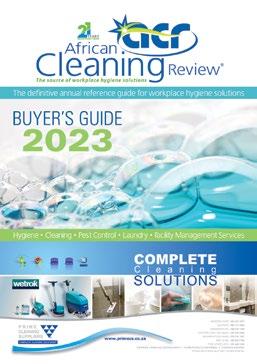
DEADLINE: NO ENTRIES CAN BE ACCEPTED AFTER 15 DECEMBER 2023
Please complete the form in BLOCK LETTERS
Company name: _____________________________________________
Head office address: _________________________________________
Email: ____________________________________________________
Website: _________________________________________________
Tel:
Cell: _____________________________________________________
Social media: Tick: FB | Twitter | LinkedIn
Other: ____________________________________________________
Major activity of company: _____________________________________
Brand/s represented: _________________________________________
Association member: _________________________________________
Tick: NCCA | ISSA | BEECA | SAFMA | SAPCA
Other:____________________________________________________
Tick: Yes, we want to advertise in the Buyer’s Guide
Tick: Logo | Strip | Websearch | Website button
Ts & Cs apply
Person completing form:
Email: ____________________________________________________
Cell: _____________________________________________________
Date: ____________________________________________________
NB: Product Entries Tick in the appropriate block/s for services, products and equipment manufactured or distributed by your company. Please tick no more than 10 main products/services as additional entries can not be guaranteed.
10 MAIN ENTRIES ONLY
